

TheJournalof EcoSpirit& EarthCare
TheJournalof EcoSpirit&EarthCare
WINTER 2025, NUMBER 1
hello@ecospirit.life
Jointly produced by PACEM IN TERRIS ECOLOGICAL INITIATIVE SPIRITUALITY & SUSTAINABILITY GLOBAL NETWORK
https://paceminterris.net
https://spirituality-sustainability.net
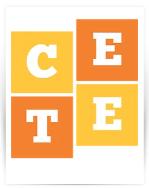

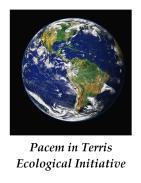
SSGNPartnerOrganizations
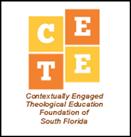




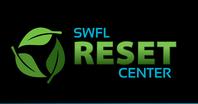


ECOSPIRIT / EARTHCARE JOURNAL is published quarterly under a Creative Commons License, which means you may reproduce anything in it provided you give an attribution and do not charge. All materials in this journal reflect opinions of the authors or creators, and they do not necessarily represent opinions of the Spirituality and Sustainability Network or the Pacem in Terris Ecological Initiative.
Dear Friends,
MessagefromtheEditors
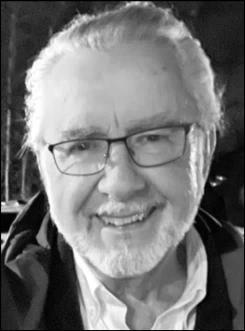
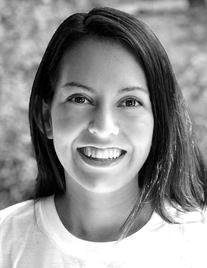
Joe Holland, Editor
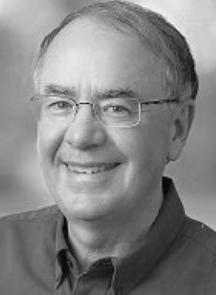
Amanda Bennett-Rivera & Jim Maclellan, Associate Editors
hello@ecospirit.life
Welcome to this first issue of our new (free) JOURNALOF ECOSPIRIT & EARTHCARE. "EcoSpirit" refers to Ecological Spirituality and "EarthCare" to Ecological Ethics. It is a joint publication of Contextually Engaged Theological Education (CETE), Pacem in Terris Ecological Initiative, Spirituality & Sustainability Global Network (SSGN).
We launched this journal because our global human family faces great ecological, social, and spiritual challenges. Therefore, we need "deep reflections" to help us analyze and understand the "difficult times" we have now entered. We hope this journal's "deep reflections for difficult times" will help us to enrich our Ecological Spirituality and intensify our Ecological Ethics.
We invite everyone interested to send us relevant "deep-reflection" essays for us to consider for publishing in this journal, as well as book reviews. These essays and book reviews can be new and unpublished, or they can be already published material, provided the author is able and willing to share copyright with us under our Creative Commons License.
We also invite everyone to point out relevant other already published "deep-reflection" essays for possible republishing in this journal, provided the author or publisher gives permission to share under our Creative Commons License.
In these difficult times, we look forward to learning from more deep reflections.
The Editors
The Path of Justice
By Faith Sebwa,
Youngest WCC delegation member at COP28 (13 years old) Kambui School for the Deaf, Kenya

From World Council of Churches publication HOPE FOR CHILDREN THROUGH CLIMATE JUSTICE and with permission of her mother
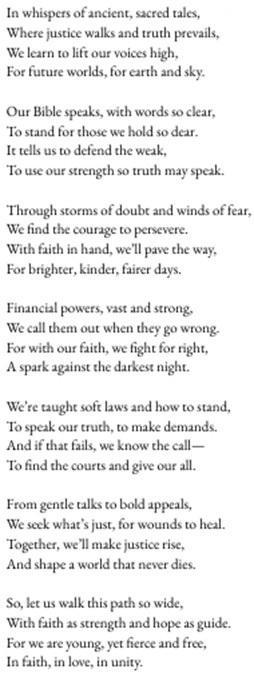
LongReads
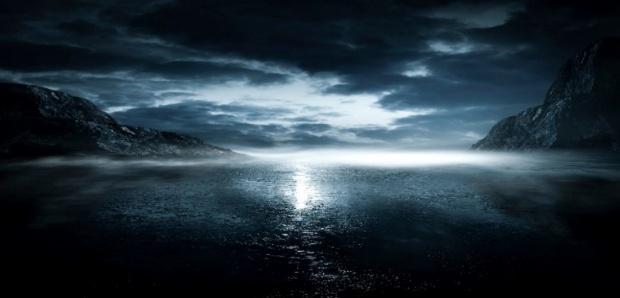
GLOBAL ECOLOGICAL DEVASTION
The Fundamental Challenge for World Religions within the New Long Dark Night at the End of the Modern World and a Humble Vision-Dream of Ecological Spirituality's Radical Love
A paper prepared for the Journal of Islamic Studies Association in India
JOE HOLLAND
Professor Emeritus of Philosophy & Religion, St. Thomas University President, Pax Romana / Catholic Movement for Intellectual & Cultural Affairs USA Co-Founder, Spirituality & Sustainability Global Network (SSGN)
Available for downloading at https://paceminterris.net/papers Version of 31 March 2025
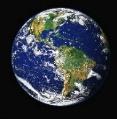
PACEM IN TERRIS CENTER FOR CATHOLIC SOCIAL TEACHING
A Project of Pax Romana / CMICA-USA https://paceminteris.net | office@paceminterris.net
Mia Stendal / Shutterstock
EDWARD "JOE" HOLLAND III, Ph.D.
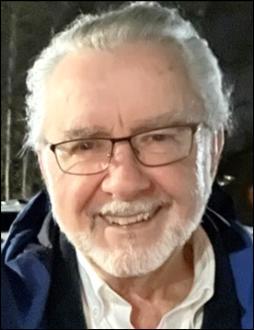
I AM AN ECO-SOCIAL PHILOSOPHER and Catholic theologian focusing on what the German Catholic philosopher Romano Guardini called, in the title of his 1950 book, "The End of the Modern World." I diagnose the end of Modern World – originally Western but now globalized – as the interwoven ecological, social, and spiritual breakdown of Modern Industrial Civilization and in both its liberal-capitalist and its scientific-socialist forms.
I also agree with ecology writer Elizabeth Kolbert that "The Sixth Extinction" (title of her 2014 book) of life on our home-planet Earth has already begun.
In addition, I see the end of the Modern World as including the breakdown of Modern Western Psychological Spirituality, a bourgeois interiority that became spiritually alienated from our loving Creator's co-creative presence within Nature and History. Correlatively, I explore the current global emergence of a regeneratively Postmodern Ecological Spirituality that is already sowing creative seeds for a global and regeneratively Postmodern Ecological Civilization.
I am a Professor Emeritus of Philosophy & Religion at Saint Thomas University in Miami Gardens, Florida; Visiting Professor de Honor at the Universidad Nacional del Altiplano in Peru; President of Pax Romana / Catholic Movement for Intellectual & Cultural Affairs USA; Editor of Pacem in Terris Press; Editor of the EcoSpirit & EarthCare Journal; and a founding board member of the Spirituality and Sustainability Global Network (SSGN).
My Ph.D. is from the University of Chicago in the field of Ethics and Society, where I pursued interdisciplinary studies in Philosophy with Paul Ricoeur, Social Science with Gibson Winter, and Theology with David Tracy. I was also a Fulbright Scholar studying church and society in Chile during the last year of the democratic-socialist government of Dr. Salvador Allende, which the military dictatorship of General Augusto Pinochet violently overthrew with strong US support.
Lastly, I have published 20 books and countless articles. One of my recent books is titled POSTMODERN MODERN ECOLOGICAL SPIRITUALITY. A new book that I am writing is tentatively titled THE ECOLOGICAL FAILURE OF MODERN WESTERN PHILOSOPHY.
A new long dark night is descending upon us. Its cause is the Modern World's dying and its dying Industrial Civilization. Yet this night is made even darker from the still-expanding global ecological devastation being inflicted by the new Global Oligarchy, with its hyper-masculine Techno-Science, its death-dealing Philosophy of Nihilism, and its financial support for the New Right's cruel politics of idolatrous nationalism, misogyny and racism, libertarian-authoritarian dictatorships, and venomously degraded religions.
However, in the midst of this dark night's many dangers, people from all spiritual traditions can begin to overcome all those destructive pathologies by nurturing a humble vision-dream of Ecological Spirituality's Radical Love.
The absence of love brought many tragedies that might have been averted. Instead of the golden rain of love, a black cloak of indifference fell upon the people. And thus, people have lost the eyes of love and can no longer see clearly … Here are the origins of the disintegration of all values and the destruction and sterilization of conscience.
Alberto Lattuada, OCCHIOQUADRATO, 19411 (Italian filmmaker reflecting on growing up under Mussolini)
We know now that the Modern World is coming to an end … Nature is rising in the very form which subdued the wilderness – in the form of power itself … Love will disappear from the public world … We seem to be rushing toward … a global catastrophe.
Romano Guardini
THE END OF THE MODERN WORLD, 1950
Only within the moment of time represented by the present century has one species – man – acquired significant power to alter the nature of his world … This chain of evil … [constitutes] man's war against nature.
Rachel Carson
THE SILENT SPRING, 1962
In Istanbul in 2019 … Ekrem İmamoğlu, the opposition candidate, won the race for mayor of Istanbul while demonstrating the power of positive emotions in politics … no one could have predicted the success of his platform of "radical love."
Ruth Ben-Ghiat
STRONGMEN,
2021
1 Cited in STRONGMEN: MUSSOLINI TO THE PRESENT, Ruth Ben-Ghiat (W.W. Norton, 2021), p. 259.
THE GLOBAL ECOLOGICAL CHALLENGE FOR CHRISTIANITY & ISLAM
sIXTY YEARS AGO ON 28 OCTOBER 1965, the Catholic Pope Paul VI issued a document that caried the Latin title, Nostra Aetate, meaning "In Our Time." Produced by the Catholic bishops of the world who had gathered for the Second Ecumenical Council of the Vatican, it reflected on the unity of our global human family and celebrated the goodness found within all world religions.
Nostra Aetate called for "dialogue and collaboration with the followers of all world religions." Today, more than ever, we desperately need that dialogue and collaboration to face together a new and overwhelming global challenge for all world religions. That challenge is the still-expanding global ecological devastation of our loving Creator's beloved Sacred Earth Life, including our Sacred Human Earth Life.
The immediate cause of this global ecological devastation is mis-guided techno-scientific attacks that are 1) still expanding the global climate crisis and 2) rapidly extinguishing living species across our planetary Biosphere. Thus, those techno-scientific attacks are devasting our loving Creator's beloved Sacred Earth life, including our own Sacred Human Earth life.
In its section 3, Nostra Aetate calls in particular for Christians and Muslims … to work together for mutual understanding and to preserve, as well as to promote together for the benefit of all humankind, social justice and moral welfare, as well as peace and freedom.2
2 For copies of this document in various languages, including Arabic, see https://www.vatican.va/archive/hist_councils/ii_vatican_council/documents/vat-ii_decl_19651028_nostraaetate_en.html
Presumably, the Catholic bishops might have repeated that same statement for all world religions. But, in fact, they used those explicit words only about Christians and Muslims. Perhaps that was an oversight, but it is also an insight. For Christianity and Islam, which are both Abrahamic religions along with the older tradition of Judaism, have the most powerful global networks of educational systems and charitable services.
Important religious initiatives to face this overwhelming global challenge have already begun within global Christianity and global Islam. We see powerful articulations of that initiative in two world-significant documents from these two powerful spiritual traditions:
▪ LAUDATO SÍ – ON CARE FOR OUR COMMON HOME, issued in 2015 by the Catholic Pope Francis 3
▪ AL MIZAN – A COVENANT FOR THE EARTH, issued in 2024 by the Islamic Foundation for Ecology & Environmental Sciences and its many partner Islamic organizations 4
I propose that Christianity and Islam, because of their global strength, and in cooperation with other world religions, are now called to play a leading role together in our global human family's global response to the overwhelming challenge of global ecological devastation.
In the following pages, I will describe that challenge and what I analyze as its deep causes. At the end of these pages, I will also propose one small spiritual response that all of us can make as a creative seed for much larger institutional responses.
3 https://www.vatican.va/content/francesco/en/encyclicals/documents/papa-francesco_20150524_enciclica-laudato-si.html
4 https://www.almizan.earth
THE END OF THE MODERN WORLD
ANEW LONG DARK NIGHT is now descending upon us. The dying of the Modern World, including the dying of its anti-ecological Industrial Civilization, is precipitating this new long dark night.5 The German Catholic philosopher Romano Guardini, writing during the mid-20th century, foresaw this dying. He named it "The End of the Modern World." 6
Today, however, we know much more about this "End of the Modern World." We know that, because of the still-expanding global ecological crisis, it could lead to the collapse of all human civilizations and to what Elizabeth Kolbert has called "The Sixth Extinction" of life on our home planet Earth.7 Further, that extinction could come suddenly through global thermonuclear war, or gradually through continuing global ecological devastation, or through both.
Although the Modern World is dying, we need to remember that the Modern World is bequeathing to us life-giving gifts, including techno-scientific gifts, all wondrously given to our human family and to our wider ecological family of creatures. We need to preserve these life-giving gifts and even expand them.
One of the Modern World's important life-giving gifts has been democracy. However, a new social class called the Global Oligarchy is trying to destroy that gift. Another example of the Modern World's life-giving gifts has been the explosion of techno-scientific knowledge, especially new healing technologies for medicine. But not all modern forms of Techno-Science have been life-
5 On the dying of the Modern World, its Industrial Civilization, and it bourgeois Psychological Spirituality, see Joe Holland, POSTMODERN ECOLOGICAL SPIRITUALITY (Pacem in Terris Press, 2017).
6 Romano Guardini, DAS ENDE DER NEUZEIT (Auflage, 1950), translated into English as THE END OF THE MODERN WORLD (Sheed & Ward, 1956).
7 See Elizabeth Kolbert, THE SIXTH EXTINCTION, 10th Anniv. Edition (Holt Paperbacks, 2024): Over the last half a billion years, there have been five mass extinctions, when the diversity of life on earth suddenly and dramatically contracted. Scientists around the world are currently monitoring the Sixth Extinction, predicted to be the most devastating extinction event since the asteroid impact that wiped out the dinosaurs. This time around, the cataclysm is us. (From the cover summary)
giving. The new Global Oligarchy has also been constructing death-dealing forms of Techno-Science that are inflicting global ecological devastation, cruel social suffering, and venomous spiritual degradation.
Those modern death-dealing distortions of Techno-Science come not from Techno-Science itself, but from modern elimination of ancient organic-circular economies. Those ancient economies primarily functioned in an organiccircular process, drawing from Nature our Sun's life-giving energy and feeding on Sun-nourished life forms across our Biosphere, while simultaneously nourishing Nature through comprehensive recycling to support organic ecological regeneration. For example, the economies of many First Nations in the Americas enhanced Nature's organic vitality, rather than extinguishing it, as modern Industrial Civilization so often does.8
Modern Industrial Civilization, in both its capitalist and its communist forms, has instead constructed mechanical-linear economies. They draw on the dark energy of ancient dead life, buried deep within Earth for thousands of years (fossil fuels), or they draw on the hyper-dangerous and hyper-expensive energy of nuclear fission. Again, while ancient organic-circular economies fed on living life across the surface of our planetary Biosphere, modern mechanicallinear economies feed on long-buried dead life. Also, while ancient organiccircular economies were guided by traditional spiritual wisdom, modern mechanical-linear economies have been guided by secularist materialism.
To repeat: pre-modern organic-circular economies excelled at regenerating life through recycling. Modern linear economies have excelled at degenerating life by producing what I will broadly call "garbage" (all forms of pollution). They pollute on such a scale that the vastness of that garbage now threatens our loving Creator's beloved Sacred Earth Life, including our Sacred Human Earth Life. The former were economies of life, but the latter have now become economies of death.
8 See Lyla June Johnson, ARCHITECTS OF ABUNDANCE: INDIGENOUS REGENERATIVE FOOD AND LAND MANAGEMENT SYSTEMS AND THE EXCAVATION OF HIDDEN HISTORY. Dissertation, 2022 at https://scholarworks.alaska.edu/handle/11122/13122.
THE NEW GLOBAL OLIGARCHY & GLOBAL ECOLOGICAL DEVASTATION
TODAY, THE NEW GLOBAL OLIGARCHY FORMS an elitist global network of predominantly male hyper-rich and hyper-powerful owners and investors. Its network is a complex and shifting alliance linking authoritarian political elites and authoritarian economic elites, especially from fossil fuels, communications, high-finance, and high-tech.9
Within the dying Modern World and its dying Industrial Civilization, many in the new Global Oligarchy act like they are self-made gods. Beginning especially with fossil fuels, and now especially through hi-tech and hi-finance, this new Global Oligarchy is using its gargantuan hyper-wealth and hyper-power to inflict cruel social suffering and unsustainable ecological devastation.
To expand their hyper-wealth and hyper-power, many oligarchs are now also promoting the New Right's idolatrous nationalism, misogynist-racist politics of fear and hate, repressive libertarian-authoritarian dictatorships, and venomous deformations of religion.10
9 On the new Global Oligarchy today, see Chrystia Freeland, PLUTOCRATS: THE RISE OF THE NEW GLOBAL SUPER-RICH AND THE FALL OF EVERYONE ELSE (Penguin Press, 2012); David Lingelbach & Valentina Rodriguez Guerra, THE OLIGARCHS' GRIP: FUSING WEALTH AND POWER (de Gruyter, 2023); Peter S. Goodman, DAVOS MAN: HOW THE BILLIONAIRES DEVOURED THE WORLD (HarperCollins, 2022); Marjorie Kelly, WEALTH SUPREMACY: HOW THE EXTRACTIVE ECONOMY AND THE BIASERD RULES OF CAPITALISM DRIVE TODAY'S CRISES (Berrett-Koehler, 2023).
For an earlier insightful analysis, see Thomas Frank, PITY THE BILLIONAIRE: THE HARD-TIMES SWINDLE AND THE UNLIKELY COMBACK OF THE RIGHT (Henry Holt, 2012).
Note that, because there are particular exceptions to my description of this new Global Oligarchy, I use the phrase Global Oligarchy as an ideal type for this new political-economic class.
10 On the New Right today, see Cynthia Miller-Idriss, HATE IN THE HOMELAND: THE NEW GLOBAL FAR RIGHT (Princeton University Press, 2020); and Cas Mudde, THE FAR RIGHT TODAY (Polity, 2019).
For the US New Right's earlier stages, see Richard A. Viguerie, THE NEW RIGHT: WE'RE READY TO LEAD (The Viguerie Company, 1980); Alan Crawford, THUNDER ON THE RIGHT: THE "NEW REIGHT" AND THE POLITICS OF RESENTMENT (Pantheon, 1980); Arnold Forster & Benjamin
The Electronic Revolution made possible the new Global Oligarchy's advances in Techno-Science.11 But instead of allowing the Electronic Revolution to develop in a decentralizing and ecological manner, the new Global Oligarchy has centralized control over the Electronic Revolution in its own hands.
It then mis-designed the Electronic Revolution to exploit private consumers and public governments and thus make itself hyper-rich and hyper-powerful.
Most seriously, the Global Oligarchy's mis-design of electronic Techno-Science is now devastating the ecological sustainability of our loving Creator's beloved Sacred Earth Life, including our Sacred Human Earth life.
So destructive is that anti-ecological mis-design that some global oligarchs are even planning to abandon our home-planet Earth (after they trashed it).
One famous global oligarch plans to use hi-tech to colonize Mars. Another plans to construct hi-tech villages in space.12
R. Epstein, DANGER ON THE RIGHT: THE ATTITUTES, PERSONNEL, AND INFLUENCES OF THE RADICAL RIGHT AND EXTREME CONSERVATIVES (Random House, 1964).
The racism of white supremacy is a central theme uniting diverse streams of the New Right across its Western network. See Chetal Bhatt, "White Extinction: Metaphysical Elements of Contemporary Western Fascism," THEORY, CULTURE, & SOCIETY, 2021, Vol. 38(1), 27-52. Chetal Bhatt also proposes that the philosophically voluntarist Nihilism of Friedrich Nietzsche (1844-1900) is equally central to the Western New Right.
On white supremacy in the United States, see Robert J. Jones, WHITE TOO LONG: THE LEGACY OF WHITE SUPREMACY IN AMERICAN CHRISTIANITY (Simon & Schuster, 2020). On Libertarian Dictatorships, see Quinn Slobodian, CRACK-UP CAPITALISM: MARKET RADICALS AND THE DREAM OF A WORLD WITHOUT DEMOCRACY (Henry Holt, 2023).
11 On the Electronic Revolution, see the now-classic book by Alvin Toffler, THE THIRD WAVE (Bantam, 1981). The author, originally a Trotskyist Marxist later turned libertarian, nonetheless provided an insightful analysis of the Electronic Revolution's significance for human history. See also the earlier and richer historical-philosophical analysis by the late Marshall McLuhan, UNDERSTANDING MEDIA: THE EXTENSIONS OF MAN (McGraw-Hill, 1964).
12 See Mary-Jane Rubenstein, ASTROTOPIA: THE DANGEROUS RELIGION OF THE CORPORATE SPACE RACE (University of Chicago Press, 2022), pp. 12-24. On more terrestrial escapes, see Douglas Rushkoff, SURVIVAL OF THE RICHEST: ESCAPE FANTASIES OF THE TECH BILLIONAIRES (W.W. Norton, 2022).
DEEPER ROOTS OF THE MODERN WORLD'S MIS-DESIGN OF TECHNO-SCIENCE
CERTAINLY, THIS NEW GLOBAL OLIGARCHY is guilty of selfishness and greed. But their mis-design of Techno-Science for the Electronic Era also has two older historical roots, both Western, that have long corrupted the Modern World's philosophical foundation.
High-Medieval Catholic Hyper-Masculinism
The first deeper root is what I call the high-medieval "hyper-masculine" paradigm for Techno-Science. We can trace that root to its source in high-medieval European Catholic clerical intellectuals' creation of universities – later to become the Modern World's central institution. (The claim that the medieval Roman-Catholic intellectual tradition was hostile to Technology and Science is a modern bourgeois fable.13)
Medieval Roman-Catholic clerical intellectuals mis-designed those early universities as hyper-masculine institutions by excluding women. 14 Sometimes, it became worse than exclusion, as in the vicious Catholic and Protestant elites' burning of so-called female witches during Europe's late-medieval and early-modern periods. (As many as 60,000 women may have been killed in that slaughter.)
Centuries later, many universities continued to exclude women (even when secularized), with women only recently entering universities in large numbers. That exclusion of women from the Modern World's central institution determined that modern Techno-Science, and most professions, would develop
13 See Nicholas Spencer, MAGISTERIA: ENTANGLED HISTORIES OF SCIENCE AND RELIGION (One World, 2023).
14 See David Noble, A WORLD WITHOUT WOMEN: THE CHRISTIAN CLERICAL ORIGINS OF WESTERN SCIENCE (Alfred A. Knopf, 1992).
with a one-sided hyper-masculine imagination of time and space. In Chinese symbolism, it was all Yang with no Yin.
Hyper-Masculinism is worse than Patriarchy. Classical Patriarchy subordinated women. Modern Hyper-Masculinism excludes women. It is not surprising, therefore, that the new Global Oligarchy cultivates a hypermasculine "macho" culture for its hi-tech industries, and that it produces a sterile Techno-Science that crushes ecological reproduction. Also, the New Right's Hyper-Masculinism, which many global oligarchs fund, adds brutal reinforcement through its hateful misogyny.
As a result, the cultural imagination of most university-trained scientists and engineers, as well as of many in other professions, has typically favored autonomous (spatially non-relational) and linear (temporally non-regenerative) techno-scientific designs. They have not factored into their techno-scientific designs Nature's organic webs or regenerative cycles. In contrast, Indigenous peoples, especially Indigenous women, have for thousands of years nourished an Ecological Spirituality that cherishes Nature's organic webs and regenerative cycles.15
15 See, for example, Robin Wall Kimmerer, BRAIDING SWEETGRASS: INDIGENOUS WISDOM, SCIENTIFIC KNOWLEDGE, AND THE TEACHING OF PLANTS (Milkweed, 2013).
There was also in the early medieval period a Keltic Catholic Church that was Indigenous. See Joe Holland, REMEMBERING INDIGENOUS KELTIC CATHOLIC CHRISTIANITY, Occasional Paper 2024, Pacem in Terris Center for Catholic Social Teaching, at https://paceminterris.net/papers, and John Philip Newell, SACRED EARTH, SACRED SOUL: CELTIC WISDOM FOR REAWAKENING TO WHAT OUR SOULS KNOW AND HEALING THE WORLD (HarperOne, 1989).
European Indigenous Keltic and Germanic Ecological Spirituality survived within the populist side of medieval Catholicism, despite the Neoplatonist flight from matter and women cultivated by elitist Roman-Catholic monastic leaders continuing the Roman imperial traditions. But, in early-modern Europe, the Protestant Reformation and the early-modern Scientific Revolution tried to strip Nature of any spiritual dimension, and they also heightened cultural masculinization.
For example, the early-modern English Chancellor Francis Bacon, son of a devout Calvinist mother and still considered the foundational prophet of modern Techno-Science, wrote of the newly emerging modern forms of Science and Technology as "The Masculine Birth of Time," and he defined Nature as a "feminine" object to be exploited, "put on the rack", and
Early-Modern Scientific Atomism
The second deeper root arose during the 17th Century. It comes from Europe's early-modern Scientific Revolution. Early-modern "natural philosophers" – as scientists were then called – appropriated for their New Science's philosophical foundation what I call the erroneous "Atomist Cosmology of Mechanical Materialism."
Those natural philosophers retrieved that Cosmology from the ancient Greek philosopher Epicurus (341-270 BC), who taught the anti-religious and mechanical-materialist doctrine called Atomism.16 Defining his atoms as the most basic material of the Universe, Epicurus insisted that atoms had no relation to each other (except via physical force). Thus, Epicurus described every "atom" (from the Greek atomos, meaning an uncuttable particle) as autonomous.
If you ever wondered where modern atomized individualism comes from, this is it. By the way, the English word "individual" comes from the Latin individuum, which means something that is "undividable." The classical Roman philosopher and senator Cicero explicitly used individuum (undividable) as his Latin translation for Epicurus' atomos (uncuttable). Thus, we can trace our contemporary use of the word "individual" back through Cicero's individuum to Epicurus' atomos.
forced to reveal "her secrets." See Carolyn Merchant's now classic work, THE DEATH OF NATURE: WOMEN, ECOLOGY, AND THE SCIENTIFIC REVOLUTION (Harper & Row, 1980).
In addition, the modern bourgeois form of Roman Catholicism also gradually lost its eco-spiritual roots, and its modernized spirituality collapsed into inner-directed psychologized forms. Yet Indigenous Eco-Spirituality continued to survive within other Christian traditions across the African, Arabic, and Greek, and Slavic regions. It is also now re-emerging across the postcolonial Global South, where Indigenous roots are still strong. However, male elites of both classical and modern Western civilizations have waged, and still wage, genocidal persecutions and wars against Indigenous Peoples, and they have constantly tried to extinguish their profound Eco-Spirituality. See Robert A. Williams, Jr., SAVAGE ANXIETIES: THE INVENTION OF WESTERN CIVILIZATION (Palgrave Macmillan, 2021).
16 Catherine Wilson, EPICUREANISM AT THE ORIGINS OF MODERNITY (Oxford University Press, 2008) and Stephen Goldblatt, HOW THE WORLD BECAME MODERN (Norton, 2011).
However, the early-modern philosophical-scientific appropriation of Epicurus' Atomism was a hyper-masculine distortion of Epicurus' ethical teaching. He had called for individuals to withdraw passively from society, and he had urged everyone to live simply in harmony with Nature. Therefore, he and close friends gathered in an isolated Nature-based "garden" (his small estate outside Athens). Epicurus' ultimate philosophical goal for himself and his friends was simply to achieve psychological "tranquility" (ataraxia in Greek).
In contrast, modern bourgeois intellectuals constructing the social philosophy of Liberal Capitalism, and more recently its late-modern forms of Libertarianism and Neoliberalism, have called for hyper-masculine individuals to be aggressive in society, to conquer Nature, and to constantly expand their material possessions. Liberal intellectuals have also urged everyone to aggressively pursue their "self-interests," to compete with each other within a "free market," and to keep government from interfering with their "freedom."
But that hyper-masculine philosophical construction of the modern liberallibertarian-neoliberal homo economicus (economic man) was a dangerous fantasy. It reduced the human person to an atomized individual and undermined the human person's social nature. It also blocked out the classical philosophical teaching that government's fundamental purpose is to promote the common good.17 Finally, that liberal-libertarian-neoliberal fantasy also repressed our natural awareness that human persons and human societies are nested within the concentric circles of Nature's ecological systems.
(In contrast, Catholic Social Teaching has long rejected the fantasy of homo economicus and, today, it also insists that "integral ecology" weaves together social ecology and environmental ecology.18)
At the opposite economistic pole from Liberal Capitalism (or Liberalism or Libertarianism or Neoliberalism), Scientific Socialism (Marxism) similarly
17 See Angus Sibley, THE "POISONED SPRING" OF ECONOMIC LIBERTARIANISM (Pacem in Terris Press, 2011).
18 See again Pope Francis' 2015 encyclical letter, LAUDATO SI'.
reduces human persons to atomized individuals. But Marxism, again in a hyper-masculine manner, then tries to massify atomized individuals from the industrial working class into a "mass" revolutionary force. ("Mass" and "force" are key concepts for modern Physics.) Thus, Marxism also has its deep philosophical ground in Epicurus' mechanical-materialist Atomism.19
Therefore, both Industrial Capitalism and Industrial Communism share philosophical grounding in the mechanical-materialist Atomism of Epicureanism. But the bourgeois intellectual constructors of both these modern ideologies rejected Epicurus' gentle and Nature-loving philosophy and substituted for it their hyper-masculine aggressiveness, their mandate to conquer Nature, and their anti-spiritual, anti-human, and anti-ecological deformation of TechnoScience.
Epicurus also taught that atoms combine into aggregates in artificially mechanical fashion because, according to him, every atom in the matter of the Universe is autonomous. He claimed that mechanical force is all that holds things together, even life forms. Further, Epicurus saw his atoms' mechanical combination as rationally and spiritually meaningless, because his Philosophy of mechanical-materialist Atomism is also militantly anti-religious and even anti-rational. Thus, Marxism's atheist Materialism and Liberalism's secularist Materialism both remain anti-religiously faithful to Epicurus' anti-religious Materialism.
However, in his ethical system, Epicurus did allow for instrumental reason to calculate the quantitative intensity of material forces, which he saw as causing either pleasure or pain in the human body. That Epicurean calculus of human pleasure and pain is the philosophical foundation for the modern ethical school of materialism known as Utilitarianism, which is the ethical system implicitly undergirding both Industrial Capitalism and Industrial Communism.
Because Epicurus allowed instrumental reason only for calculation of quantitative material forces, that is why the modern deformation of Techno-Science
19 Karl Marx wrote much of his doctoral dissertation at the University of Berlin on Epicurus.
excludes from its method any guidance by qualitative spiritual wisdom. Therefore, Alfred North Whitehead (1861-1947), the English mathematician and founder of Process Philosophy, rightfully named this modern philosophical reductionism (stripped of guidance by any spiritual wisdom) as "Scientific Materialism."
Overall, the liberal (or libertarian or neoliberal) and Marxian fantasy of homo economicus – again with both drawing on Epicurus' mechanical-materialist Atomism but with modern hyper-masculine reframing – are but two examples of the countless ways that modern bourgeois elites embraced Epicurus' mechanical-materialist Atomism and wove it in distorted form into their modern ideologies.
Modern bourgeois elites, by following that hyper-masculine reframing of Epicurus' atomist-mechanical-materialist Philosophy, have precipitated what I describe as the "Culture of Atomization," promoting individualism. I also describe it as the "Culture of Mechanization," promoting conformist mass society, and the "Culture of Materialism," generated by the competing materialist ideologies of Industrial Capitalism and Industrial Communism. However, and again, that hyper-masculine and atomist cultural drive undermines the dignity of the human person, disintegrates organic human community, devastates natural ecology, and dissolves both rational and spiritual meaning.
By accepting the Modern World's foundational philosophical errors, the new Global Oligarchy has been mis-designing the Electronic Revolution according to the modern techno-scientific biases of Hyper-Masculinism and non-relational and non-regenerative Atomism.
As a result, their mis-design of electronic Techno-Science is now devastating Nature's relational webs and regenerative cycles. Consequently, the future of
our loving Creator's beloved Sacred Earth Life (in which we humans participate) suddenly appears bleak and frightening.20
Thus, the new Global Oligarchy, by expanding its libertarian-authoritarian distortion of the Electronic Revolution, is desperately trying to keep alive the dying Modern World and its dying Industrial Civilization. To do that, however, this new Global Oligarchy needs to block awareness of the Modern World's foundational philosophical errors and the Modern World's mis-design of TechnoScience.
To that end, this new Global Oligarchy continues to escalate the Modern World's ecological, social, and spiritual devastation. Instead of preparing for a fresh and regenerative Global Ecological Civilization, the new Global Oligarchy is now forcing its misguided electronic Techno-Science into integral-ecological devastation of our Loving Creator's beloved Sacred Earth Life, including our Sacred Human Earth Life.
Unless stopped, this new Global Oligarchy will continue to escalate what we have seem Science writer Elizabeth Kolbert identify as "The Sixth Extinction" of biological life across our garden planet Earth, which includes our human life.21
THE SPIRITUAL DISEASE OF VENOMOUS RELIGION
DURING THE FIRST HALF OF THE 20TH CENTURY, the French Catholic philosopher Emmanuel Mounier (1905-1950) intellectually challenged the French Old Right's deformation of Catholic Christianity in order to support French Fascism. He called it "Christian Fascism" and described it as a "spiritual disease." Mounier also proposed that this "spiritual disease" reaches
20 For one example of a new global oligarch's hi-tech embrace of hyper-masculine and atomizing individualism and conquest of Nature, and one drawing on a philosophical architect of Italian Fascism and Nietzschean Nihilism, see the TECHNO-OPTIMIST MANIFESTO, by Mark Andreesen, hi-tech inventor, entrepreneur, and venture capitalist, at https://a16z.com/thetechno-optimist-manifesto.
21 See again Kolbert, SIXTH EXTINCTION.
"deep into the human psyche," and he even wondered if it might be "demonic."22
Many people are now rightfully fearful and angry at the Modern World's stillgrowing ecological devastation, social cruelty, and spiritual deformation – all consequences of the new Global Oligarchy's techno-scientific degeneration of human ecology and natural ecology, on which human society depends.
In response to that populist fear and anger, many new global oligarchs have embraced the New Right's deformation of religion, which cruelly mis-directs populist fear and anger toward innocent scapegoats. I call this deformation
"venomous religion," and I see it as infected with the same spiritual disease that Emmanuel Mounier condemned.
As the adjective "venomous" indicates, the New Right's spiritual disease is poisonous. While claiming the mantle of Christianity or other religions, it supports cruel and even murderous anti-social and anti-ecological policies. Those policies cause horrendous suffering and death for vast numbers of our loving Creator's beloved creatures, who make up our Sacred Earth Life, including millions of our loving Creator's impoverished and vulnerable but still beloved human creatures.
The New Right's venomous religious forms, to which some in the new Global Oligarchy have turned, are deadly deformations of authentic religion in two ways.
▪ First, they highlight only certain religious themes that fit with the Global Oligarchy's anti-ecological and anti-social ideology.
▪ Second, they ignore or still worse condemn prophetic themes that are hostile to their hyper-masculine and atomizing 'freedom.'23
22 See Joe Holland, EMMANUEL MOUNIER ON COMMUNITARIAN PERSONALISM, Occasional Paper 2024, Pacem in Terris Center for Catholic Social Teaching: https://paceminterris.net/papers
23 Emma Goldberg, "Seeking God, or Peter Theil, in Silicon Valley," New York Times 2025-0211 : https://www.nytimes.com/2025/02/11/business/silicon-valley-christianity.html.
Thus, while the New Right's Venomous Religion provides the new Global oligarchy with a comforting pseudo-spirituality of individualistic consolation, it also unleashes demons of idolatrous nationalism, ethno-racist hatred, and vicious misogyny, just as it supports ecological devastation, social cruelty, and spiritual degradation.
Within the United States, some global oligarchs have turned to a degradation of Calvinist Christianity, which has become the strongest US New Right religious stream.24 The second strongest US stream is the New Right's degradation of Catholic Christianity.25 Across the planet, other New Right intellectuals, politicians, and activists have been constructing other deformed versions of Buddhism, Christianity, Hinduism, Islam, and Judaism.
In summary, as we look out historically at the dying Modern World and watch the gradual collapse of its anti-ecological Industrial Civilization, we see this new Global Oligarchy, with its destructive philosophy of Nihilism, still increasing its already hyper-wealth and hyper-power.
We also see this new Global Oligarchy supporting the New Right's misogynistracist scapegoating and its destructive politics of idolatrous nationalism, libertarian-authoritarian dictatorships, and venomous religions.
Most importantly, we see this new Global Oligarchy continuing to expand its mis-designed electronic Techno-Science to ecologically, socially, and spiritually devastate our loving Creator's beloved ecological community of Sacred Earth Life, including our Sacred Human Earth Lfe.
24 See Elizabeth Neumann, KINGDOM OF RAGE: THE RISE OF CHRISTIAN EXTREMISM AND THE PATH BACK TO PEACE (Worthy Publishing, 2024). For the most extreme version, see Julie J. Ingersoll, BUILDING GOD'S KINGDOM: INSIDE THE WORLD OF CHRISTIAN RECONSTRUCTION (Oxford University Press, 2015). For a prophetic Calvinist critique, see David A. Ritchie, WHY DO THE NATIONS RAGE: THE DEMONIC ORIGIN OF NATIONALISM (Wipf & Stock, 2022).
25 See Mary Jo McConahay, PLAYING GOD: AMERICAN CATHOLIC BISHOPS AND THE FAR RIGHT (Melville House, 2023). The subtitle focuses on bishops but is misleading. As the book shows, the initiative and main support comes not from bishops but from elite lay Catholics who have played prominent roles in the New Right movement.
A HUMBLE VISION-DREAM ABOUT ECOLOGICAL SPIRITUALITY'S RADICAL LOVE
AGAIN, THE MODERN WORLD and its Industrial Civilization have entered their terminal death throes. Further, the new Global Oligarchy is escalating ecological devastation, social cruelty, and venomous religion. As a result, a new long dark night is descending upon us, and many people now see the future as devoid of hope.
Yet even though the outer world may seem without hope, we can turn inward to our human family's inspirational spiritual imagination. If this spiritual imagination grows ecologically and globally, our human family will generate powerful spiritual energy for regenerating our loving Creator's beloved ecological community of Sacred Earth Life, including our Sacred Human Earth Life (even if we do not yet fully know what forms this spiritual energy will take).
Therefore, let us begin by imagining a humble vision-dream about our human family's ancient tradition of Ecological Spirituality, as found especially in the eco-spiritual traditions of ancient Indigenous Peoples, from whom we have all descended.
LET US DREAM that our global human family's many spiritual traditions, despite their many problems, will become prophetic voices in our great struggle to protect our loving Creator's threatened Sacred Earth Life and, within it, our threatened Sacred Human Earth Life.
LET US DREAM, from within the womb-like darkness of this new long night, that our global human family's many spiritual traditions will gestate a regenerative global wave of Ecological Spirituality's Radical Love.
LET US DREAM that this regenerative global wave of Ecological Spirituality's Radical Love will call us to love our loving Creator and to love our loving Creator's beloved Sacred Cosmic Creation, including our loving Creator's beloved Sacred Earth Life and, within it, our beloved Sacred Human Earth Life.
LET US DREAM that this regenerative global wave of Ecological Spirituality's Radical Love will help us to resist the new Global Oligarchy – with its hypermasculine and atomist-mechanist-materialist Techno-Science, its destructive philosophy of nihilism, and its support for the New Right's idolatrous nationalisms, misogynist-racist fear and hate, repressive libertarian-authoritarian dictatorships, and spiritual disease of venomous religions.
LET US DREAM that this regenerative global wave of Ecological Spirituality's Radical Love will guide our human family out of the dying Modern World, out of its collapsing anti-ecological Industrial Civilization, and out of the new Global Oligarchy's intensification of ecological devastation, social cruelty, and spiritual degradation.
LET US DREAM that this global wave of Ecological Spirituality's Radical Love will open for our human family an integral-ecological pathway toward a regenerative, humanistic, and democratic Global Ecological Civilization, that will be inspired by the powerful energy of this same ancient Ecological Spirituality.
LETUSDREAM that this global Ecological Civilization will celebrate the sacred character of our loving Creator's Cosmic Creation, including our ecological community of Sacred Earth Life and, within it, our Sacred Human Earth Life.
LET US DREAM that this regenerative global wave of Ecological Spirituality's Radical Love will teach all of us in our global human family, including global oligarchs, to let go of selfish and greedy desires for wealth and power, and thereby overcome the demons of individualism, philosophical nihilism, misogyny and racism, hyper-masculinism, idolatrous nationalism, and venomous religion.
FINALLY, LET US DREAM that this global regenerative wave of Ecological Spirituality's Radical Love will teach all of us, including global oligarchs, to live with loving and humble care for our loving Creator's deeply-threatened ecological community of Sacred Earth Life, including our deeply-threatened ecological community of Sacred Human Earth Life.
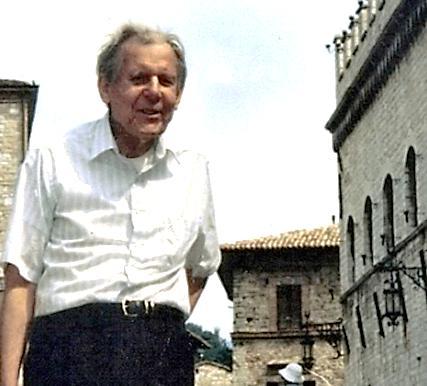
Thomas Berry in Assisi, Italy
S.A.F.E. IN THE ARMS OF TOM BERRY
ELISABETTA FERRERO
ELISABETTA FERRERO, PH.D.

Dr Ferrero is Professor Emerita of Ethics at Saint Thomas University in Miami, Florida. A native of Italy, she is also a published poet in Italian and English.
She was closely involved with the Earth Charter process since 1998, when she worked on the official Italian translation of Draft II of the Earth Charter and started an Italian Earth Charter National Committee.
Along with Dr. Joe Holland, she is the author of The Earth Charter: A Study Book of Reflection For Action [Redwoods Press, 2002], which has been translated into Italian, Portuguese and German. She has held conferences and seminars at various universities.
Among the conferences which she has organized are the ten Spirituality & Sustainability Conferences in Assisi and Rome. These were born in the early 1990s as part of SAFE (Study Abroad For Earth) Program. In Assisi, students learned from scholars such as Tom Berry & Brian Swimme. The most recent conference was held in June 2023 in Assisi and Rome.
The SAFE Program received the Rodale Foundation Award in 1992 (out of 1,600 colleges and universities that applied) due to St Thomas University’s most innovative environmental education programs. International scholars came to the Rome-Assisi conferences, and they worked side by side with students who continued their studies through the SAFE programs. They learned from one another and transformed their consciousness.
TWENTY-SEVEN STUDENTS TRAVELED TO ITALY to spend six weeks participating in Saint Thomas University’s ecological study abroad program, Study Abroad for Earth (S.A.F.E.), in Assisi, the European environmental capital. They came from colleges all over the United States and stayed at a local family-owned hotel in the heart of Assisi, The Posta Panoramic, where the cook was having a fit to serve them vegetarian meals instead of their pride and joy as the Umbrian capital of veal cutlets. Many of their classes were outside, amongst the millennial olive trees overlooking the Spoleto valley, which were so dear to Francis of Assisi.
In March of the same year I had called Tom Berry, whom I had never met before, but I had read more than once his book, The Dream of the Earth. With a trembling voice I explained to him the need for a transformative education which was not happening in the classroom. Also, I was asking him to travel to Assisi, Italy, to become the Visiting Scholar of our S.A.F.E. program which I had just organized. After a long silence which seemed endless to me, with a soft voice Tom asked me what the dates were … and an incredibly transformative education was born!
Since the days of St. Francis and St. Clare, Assisi, Italy, has been a locus of activities to promote an ecologically sensitive spirituality as well as the site of educational initiatives. However, S.A.F.E. was different from other environmental study abroad programs because it had the specific intent to embrace another bioregion’s culture while studying environmental and social justice with top scholars in the humanities and the sciences. Its unique feature was that the main visiting scholar was Fr. Thomas Berry, and all the humanities and sciences courses were centered on his cosmology.
S.A.F.E. attracted numerous students from various colleges interested in Berry’s work. Moreover, the same students would return summer after summer. The students who had participated in the Assisi program engaged regularly with other students to discuss what they had learned; many changed their majors to include an ecological component to their studies. The synergy that Thomas Berry created was contagious among all participants. Each summer he was flanked by eminent scholars in the humanities and sciences. One
of the highlights in 1993 was the presence of Dr. Brian Swimme, who came to Assisi with his entire family and 48 The Ecozoic Journal No. 6 (2021): The Living Legacy of Thomas Berry often taught his classes in the fields surrounding San Damiano. One day he asked each student to get close to one of the millennial trees growing there and to feel its energy. It was an amazing sight to see thirtyfive young adults quietly and deeply connected to all those olive trees!
In 1995, while S.A.F.E. was underway in Assisi, through Saint Thomas University and the Center for Respect of Life and Environment of the Humane Society of the United States, I organized and directed the first of six summer Spirituality and Sustainability Conferences culminating in the year 2000. Eminent leaders from various fields met once a year for a week-long series of intensive conferences/workshops in which moral questions, such as international relations, medical ethics, justice, and equity were researched and discussed; then implementations, based on solid grounding of values, were agreed upon.
The title, “Spirituality and Sustainability,” points to its ethical dimension while at the same time there was a departure from an anthropocentric position to a holistic one, i.e., a sustainable future.
One of the important outcomes of having both the S.A.F.E. program and the conferences running alongside each other was the incredible synergy produced students participated in the many presentations while they interfaced with the scholars. The primary purpose of these conferences was to identify and celebrate developments in religion, economics, science, education, politics, and the arts to promote eco-justice and sustainability. Thomas Berry was the keynote speaker at these conferences while the presenters and participants were from the humanities and the sciences, NGOs, and religious groups who returned summer after summer.
The presence of Fr. Berry in Assisi was not just the focal point of intellectual dialogue within the study abroad programs and the conferences, for the entire city participated in these extraordinary events taking place during the summer months. The owners of the shops around the fountain in Assisi’s main square would wait impatiently for Padre Berry’s presence and open smile.
The Posta’s cook would think of new sweet treats to prepare for him. At sunset, as the colors of the sky took on muted and splendid shades in Assisi’s piazza, at one of the coffee shop’s outside tables, the one closest to the florist shop, one would find Tom Berry and a large circle of students, colleagues, and friends from Assisi and abroad all around him. More than once, someone had to go and fetch him letting him know that the pasta was ready!!
Fr. Berry loved children. In Assisi, a few participants came with their spouses and young children. Tom spoke to them with the gentleness and kindness of a child himself, and the children flocked to him and quietly sat mesmerized by his presence through all his lectures.
Thomas Berry’s presence in Assisi twenty-five years ago still echoes in me today as I ponder education and how our students’ needs are not being met. What I believe is at the root of the multi-faceted problems in our youth is the total body/soul dis-connection stemming from the disconnection of the human from the natural world. Unless this twofold connection is re-established at all levels and in all areas of education, curricular and structural changes will not amount to any real transformation in our students.
The disorder and the disconnection from the natural world represent historical breaks from Catholic theological tradition as well as from natural law (Berry 1999). Over the last three hundred years, this faulty perception of the relationship of the human to the natural world has done immeasurable harm and truly is at the root of the plagues of our times (Berry 2009). What is needed in education as in all other institutions is a fundamental shift to adopt a new paradigm along with a change of values and views (Berry 1999).
To reconnect the human to the natural world is obviously the solution; however, we must re-connect emotionally, not simply come forth with an intellectual critique or plan of action. We must shift from the predominant and exclusive employment of logos to include pneuma. With our polarized perception of the world today, we are unable to co-exist with nature. We must move beyond the world of dualities. Darkness needs to embrace light; reasoning and imagination must become one; female defines itself in the dialogue with male;
below and above must become part of the same continuum in the spiral of life (Spretnak 2011). The East has always known that a polarized world is a fragmented one and thus a weak one; therefore, it has reconciled all opposites–something that is lacking today in our Western civilization.
My students of philosophy, as part of the service component of their course requirements, grow a few vegetables and flowers at the corner of the St. Thomas University’s spacious grounds. On their first day, their impeccable white sneakers meld in the brown terrain. They farm in the worst of conditions an old-fashioned irrigation system and only a handful of tools yet they are “nourished” by this humble task in a simple, non-verbal, non-linear, nonlogical relationship to the natural world (50, The Ecozoic Journal No. 6, 2021: The Living Legacy of Thomas Berry).
I never try to make farmers out of them. I talk to my students a lot about empowerment- but little do we know, as educators, that it is the natural world alone which can open, rekindle, and nourish their hearts. Today, this re-connection to the natural world, not in fragmentary terms but as a whole being, is the number one pedagogical remedy essential for real transformation in our students. As Tom repeatedly said, the natural world is the context for the human; and the devastation of the natural world will bring about the desolation of the human, and both will perish or grow as one (Berry 2009).
By connecting with the natural world, one develops an openness which becomes compassion for all forms of life. There is so much that is mysterious in life that can only be experienced, with a deep sense of awe, by walking with gentleness and dignity towards all forms of creation. By doing so, we reconnect our heart and soul to our body—a long lost connection. We live at a time when the cult of the body prevails, and yet there is no real connection with the body because such a bond is only possible where the heart and the body meet in stillness, beyond logic.
The role of the human on this Earth is a privileged one, but somehow, we have trivialized our sense of being sacred. How can we continue to talk about spirituality and refer only to our human spirit?
Medieval mystics saw the interrelationship of body and soul in a universe permeated by the divine. Then, the Cartesian split of matter and spirit by removing the soul from nature and from the human body except for the pineal gland in the human brain not only alienated the human from the natural world, resulting in its subsequent devastation, but also impoverished our inner life, which is dependent upon the exchange of spiritual energy and wisdom from the natural world. In this exchange of energy and wisdom, the divine is evoked, and through this deep bond we are healed and transformed (Berry 2009).
This is why we cannot speak of disease of the body without understanding that the soul is also suffering, that it too is diseased and that it is no longer working in harmony but is out of sync with the body. Action, or work, has to become the work of the body and the soul connected and working as one. As the body and the soul work together, the person comes to trust the heart without anxiety. With a deep sense of tranquility, one has a clear perception and is open to going beyond oneself to enter into a real encounter with the world. When body and spirit are synchronized, one feels grounded in a particular place, like a tree whose roots expand under the ground and draw nourishment from all surroundings. This causes a feeling of belonging. Everything is where it needs to be since it cannot be controlled, eradicated, or used but exists in a common destiny on this Earth.
The natural world needs to become the primary context for all forms of education (Berry 1999). Within this context, all curricula need to reflect the expression of the student through movement, sounds, words, shapes, and colors as the way by which s/he can experience what s/he is learning. The fine arts, creative writing, and music in our educational systems and programs are often separated from other disciplines they are labeled “artistic subjects” vis-a-vis “cognitive disciplines.” All departments and disciplines must recognize the cognitive and the artistic subjects as being equally important and indispensable in the learning process. Thus, the challenge is to incorporate them into new curricular and transformative pedagogical modules.
What we need is to embody in our educational system the very fundamental laws and principles of nature. Today, students are usually excluded from the subjects that they learn, and thus they do not see themselves and their own story as part of the wider story of what they are learning and of the universe (Berry 2009). Such awareness cannot come about only by cognitive exercises. I am proposing that story-telling, playwriting, painting, dance, music, and poetry no longer be relegated to the fine arts department but rather be incorporated in the course objectives and outcomes of all disciplines. We, as educators, must become co-creators with our students in order for a real transformation to occur in our lives and in the universe.
REFERENCES
Berry, Thomas. 2009. The Christian Future and the Fate of Earth. Edited by Mary Evelyn Tucker and John Grim. Maryknoll, New York: Orbis Books.
Berry, Thomas. 1999. The Great Work: Our Way into the Future. New York: Bell Tower.
Spretnak, Charlene. 2011. Relational Reality. Topsham, ME: Green Horizon Books.
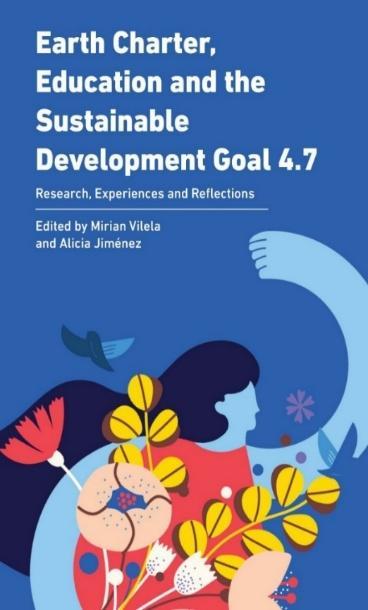
EditedbyMirianVilelaandAliciaJiménez
University for Peace in collaboration with Earth Charter International
SUSTAINABILITY & GLOBAL CITIZENSHIP
VALUES EDUCATION WITH THE EARTH CHARTER
Reflections, Experiences, and Pedagogical Elements
CHAPTER 1 BY MIRIAN VILELA
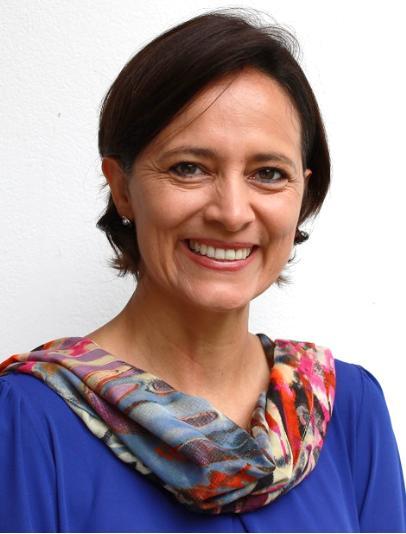
Vilela
Mirian is Executive Director of the Earth Charter International Secretariat and the Center for Education for Sustainable Development at the University for Peace in Costa Rica. She has been working with the Earth Charter Initiative since early 1996. She coordinates the UNESCO Chair on Education for Sustainable Development with the Earth Charter and from 2005 to 2014 servedasamember of the UNESCO Expert Reference Group for the Decade of Education for Sustainable Development (DESD). Mirian holds a B.Sc. in International Trade, a Master´s Degree in Public Administration from the Harvard Kennedy School of Government, where she was an Edward Mason Fellow, and a Ph.D. in Education with emphasis in pedagogical mediation.
Mirian
For more than 20 years, several individuals and organizations have worked with the Earth Charter in education settings, contributing to the field of Education for Sustainability and of Education for Global Citizenship with a special focus on values clarification and analyses.
These experiences demonstrate that values-based education can be accomplished through self-reflections on practical and real-life situations, interactions, dialogue and participatory processes. They also demonstrate that this process does not have to be abstract, rigid, vertical or by imposition.
WHEN WE LOOK AROUND THE WORLD and see so many problems of environment degradation, conflict, poverty, social disparity and corruption, we could say that most of these problems are caused by leaders, or decision-makers, whoarenotshort ofaccess toformal“education.”Infact,we could argue that most of these leaders had access to higher education, with a certain "quality."
There are many lawyers, engineers, public officials, man- agers and business people around the world, who are in major leadership positions, making many decisions that have major social and environment impact, but without a clear vision, concern, or a sense of responsibility with the common good. We can see this through several examples of corruption and environment disasters caused by some industry, such as collapse of dams caused by mining waste full of contaminated mud, devastating the lives of people and ecosystems. These are the results of decisions made by unethical leaders who, we could say, are socially and ecologically illiterate. And this should lead us to question how professionals are being prepared to address the needs of society.
INITIAL QUESTIONS & SETTING THE BASIS
Over the past 20 years, I have been dwelling with the question of how to incorporate sustainability ethics, or the vision and values of sustainability and global citizenship articulated in the Earth Charter, in education settings; and specially, how to do that in the best possible way and in a manner that is not
limited to a theoretical or conceptual discussion, nor vertical or imposing, but rather that would be meaningful and conducive to a transformative learning experience. Over the years, I have been searching for ways to accomplish that while putting it into practice. This is certainly an ongoing searchandaprocess forwhich there is no single answer, nor a single recipe.
One thing that has intrigued me from early on is that in the midst of the current social and environmental challenges that we experience across the world, what we need is not just more education (at least not of the same kind), but another kind of education. That is, education is not limited to share/ consume information or simply seek to inculcate sustainability and global citizenship concepts in a decontextualized, meaningless, fragmented way, but one that nurtures and cultivates a worldview that is based on ethics of care and responsibility to the common good, ethics of respect for the com- munity of life. Inevitably, this is directly linked to values-based education or values education.
In this context, I started researching, analyzing and reflecting on experiences of how different groups have used the Earth Charter, in different areas and contexts, as an educational instrument, including my own experience, to identify pedagogical elements of values education with the Earth Charter that could lead to meaningful experiences for the learner. My intention is to offer some insights and key elements for those interested in working with the Earth Charter in education settings as well as those interested in sustainability and/or global citizenship education, from a values perspective or to anyone interested in deepening and expanding their understanding of how this could take place. I start from the understanding that the Earth Charter articulates a comprehensive vision of the values that can lead us to sustainability and global citizenship.
In my journey, I realized the need to demystify values education or valuesbased education, as I often come across people who believe that it is impossible to make this happen without imposing one's values and world- views on others. I also often come across people who believe values-based education is not relevant, nor necessary to the current and urgent needs of society dueto
a perception that it is verytheoretical,non-practical, notconnected to real life, and does not offer the useful skills people need to learn. With this presupposition, those who favor such perspective undermine the potential of values education as an instrument for social transformation to- wards a more just, sustainable and peaceful world.
Before the launch of the Earth Charter in the year 2000, during the years of consultation and drafting processes, many workshops took place not only to identify the values and principles that should compose the Earth Charter, but also on their meaning and how they could be articulated, brought into practice or incorporated in different contexts. Therefore, the consultation and drafting process of the Earth Charter was in itself a very important learning and educational process as it generated numerous cross-cultural and cross sectoral dialogues to share diverse understandings and interpretations of each of the key concepts and ideas that could frame the broad worldview of sustainability and global citizenship aspired for the Earth Charter.
For instance, when different people, especially from different cultures and areas of knowledge, come together to discuss the meanings and different ways to translate and interpret concepts, many ideas emerge. What comes to our mind when we hear: Care, Care and Respect for the Community of Life, Compassion, Compassion to Animals, Respect Life’s Diversity? These concepts can have slightly different meanings, in theory and in practice, for different people. Furthermore, you can translate these words literally or you can add, in the process of translation, the cultural and con- textual interpretation of the same word and the meaning will change. When you enter into an exercise to translate key concepts into practice, the possibilities are numerous.
From my perspective, the purpose of our work in bringing the Earth Charter to education practice has been to expand and deepen human vision and consciousness regarding how we ought to relate with ourselves, with one another and with the great community of life. Thus, the question we should constantly askourselvesishowwerelateandhowweoughttorelate among ourselves and with others, and whether we can expand our frontiers of care and responsibility. See Earth Charter Principle 16f, it states Recognize that peace is the
wholeness created by right relationships with oneself, other persons, other cultures, other life, Earth, and the larger whole of which all are a part. This requires a process of education and learning that is not conventional, nor based on memorizing concepts and theories. The point is that education has always been central to the Earth Charter Initiative. Principle 14 affirms the importance to Integrate into formal education and life-long learning the knowledge, values, and skills needed for a sustainable way of life. Once this vision has been set, the question is how to make it happen.
A BIT OF BACKGROUND
Towards the end of the Earth Charter consultation and drafting process, two efforts laid the ground for the work of Earth Charter Education: first, a workshop, organized by the Earth Council and the Fetzer Institute, which took place in May 1999 in Costa Rica with the purpose of exchanging experiences and ideas on how to use the Earth Charter in education settings. Then, an Education Conference took place in August 1999, organized between the Paulo Freire Institute, Brazil and the Earth Council, which back then, was the organization that was coordinating the Earth Charter efforts worldwide. These were initial efforts to collect experiences and ideas of how to work with the Earth Charter in education setting and to generate initial guidelines and the foundations for future work.
Subsequently, in the year 2001, an international advisory committee was put together by the Earth Charter International Secretariat, to generate guidelines for the development and implementation of an Earth Charter Education Programme. The result of this work was later updated, building on approximately 10 years of experience of working with the Earth Charter in education, into the Guide for Using the Earth Charter in Education, which was launched in April 2009 at the UNESCO World Conference on Education for Sustainable Development held in Bonn, Germany.
Among other things, this guide stresses the importance to avoid proselytizing and it states that education for sustainability, as informed by the Earth Charter, should help learners to understand the challenges and critical choices
that humanity faces and appreciate the interconnections be- tween these challenges and choices; to comprehend the meaning of a sustainable way of life and of sustainable development and to create personal goals and values conducive to a sustainable way of living; and, to critically evaluate a given situation and identify action goals for bringing about positivechange.(EarthCharter International, 2009) This is precisely how, many groups and we, at the Earth Charter International Secretariat and Education Center, have been using the Earth Charter. This guide, which served as the basis of our work, has also highlighted that there is not a single “best way” to use the Earth Charter in education; much of it depends on the context, as well as on the interest and creativity of the learner and the educator (Earth Charter Initiative, 2009).
On the other hand, for more than 15 years, UNESCO has been promoting new approaches to education with a special emphasis on education for sustainable development and education for global citizenship. The idea was initially articulated at the 2002 World Summit on Sustainable Develop- ment (the Johannesburg Summit) and then during the United Nations De- cade on Education for Sustainable Development (UNDESD 2005-2014). According to the Implementation Scheme for the UNDESD, the overall goal of this effort was to integrate the values inherent in sustainable development into all aspects of learning to encourage changes in behavior that allow for a more sustainable and just society for all (UNESCO Executive Board 171 Ex/7 March 2015). This begs the question of what those values are and how to bring them to all education settings. That effort was followed by the UN- ESCO Global Action Programme on Education for Sustainable Development (GAP on ESD 2015 –2019).
Moreover, through the Global Education First Initiative (GEFI), launched by the United Nations Secretary General in 2012, the importance of fostering global citizenship through education was emphasized. Then in 2015, The World Education Forum adopted the Incheon Declaration, articulating governments’ agreement on “essential elements” of the Education 2030 Framework for Action, which became the new education agenda for the United Nations outlining priorities and goals in this area for the period from 2015 to 2030. At the same time, the Education 2030 framework is aligned with the United Nations’
Sustainable Development Goals (SDGs), also launched in 2015. Note that the SDG 4.7, highlights the importance of education for sustainable development and global citizenship, among others.
According to the Incheon Declaration, quality education should foster creativity and knowledge… and should also develop “the skills, values and attitudes that enable citizens to lead healthy and fulfilled lives, make informed decisions, and respond to local and global challenges through education for sustainable development (ESD) and global citizenship education (GCED), (UNESCO, 2015, Incheon Declaration and Framework for Action, para. 9 p. 7).
It also affirms that the content of such education must be relevant, with a focus on both cognitive and non-cognitive aspects of learning. The knowledge, skills, values and attitudes required by citizens to lead productive lives, make informed decisions and assume active roles locally and globally in facing and resolving global challenges can be acquired through educationforsustainable development (ESD) and global citizenship education (GCED), (UNESCO, 2015, Incheon Declaration and Framework for Action, para. 62, p. 47).
It is importantto highlight thatboth approaches, Education forSustainable Development (ESD) and Education for Global Citizenship (Global Citizenship Education - GCED), essentially require values education or values-based education. Both proposals have to do with education for change, or for social transformation; neither of these two approaches is limited to content. Both look for new approaches in the way the education experience takes place to be more meaningful, contextualized, participatory and transformative. Both require a planetary worldview and emphasize the im- portance of infusing values in education to expand our sense of belonging and responsibility to a planetary level. ESD and GCED are quite similar in terms of pedagogical approaches, values and the concept itself.
In my view, the main difference is that GCED is more focused on human relations, on improvinghowwehumansrelatetooneanotherandinhelping people learn to live well together in the midst of our cultural differences. Whereas ESD is broader in the sense that it addresses the former but also leads us to consider how we relate with nature and consider the wellbeing of present and
future generations. ESD should lead us to expand our sense of responsibility to care for humans and the larger living world and find ways to live within life supporting systems carrying capacity
However, despite the fact that values are often stressed as part of these United Nations education agendas or proposals of education for change, and in national education discourses, when it comes to implementation, it often finds a void. After years dealing with this, I think it happens partly because of fear or difficulty to address the question of which or whose values, compounded by the belief, or misperception that values education can only be undertaken by imposing someone’s values upon others.
To respond to this concern, we could affirmthat the Earth Charter is widely recognized for articulating the values and principles of sustainability and planetary citizenship. It has been endorsed and adopted by thousands of individuals and organizations. UNESCO adopted two resolutions, which recognize the Earth Charter as an important ethical framework for sustain- able development and as an education instrument. In addition, I agree with Dower’s assertion that the Earth Charter, as a global ethic, provides content that guides towards a global citizenship and therefore any global citizen looking for a reasonable global ethic can find it in the Earth Charter (Dower, 2005).
THE RESEARCH
Within this context, I set forth to find outhow to bestincorporate the values and ethics of sustainability and global citizenship articulated in the Earth Charter in processes of education and learning. For that, I reflected in my own experience of about 25 years using the Earth Charter as an educational instrument and researched 126 other Earth Charter education experiences carried out in diverse contexts by various groups in all seven continents of the world. Then, I analyzed more closely 44 of these experiences from higher education, primary and secondary schools and non-formal education settings.
The result of the study shows that there is a variety of perspectives on how to approach values education using the Earth Charter as an instrument.
Moreover, it certainly does not have to be a theoretical, rigid or vertical experience. Some of these experiences begin by inviting participants to relate the values of the Charter to a situation they have experienced or, on the contrary, to observe a situation in their communities or of their own and link it to values or the lack of these, to generate reflection and dialogue on the topic. Thus, identifying the consequences of our actions, as well as the meaning and relevance of values, which drive decisions and actions in a given context. In most of these examples, we found processes of reflection, dialogue, action, and again reflection on the lived experience. This reaffirms the notion that there is no ethics without an experience in practice, and the fact that experiences require reflection (before and after they occur) to be more effective.
The study also revealed that the Earth Charter has been used as an educational instrument, as an ethical reference or as a guide with which to address everyday ethical dilemmas. It has also been used to stimulate a critical reflection of reality, as well as of the impact of our decisions on the environment, and to evaluate how the values and principles set forth relate to one's mental models, beliefs and decisions. We can find many similarities in the approaches identified and studied in this research.
Many of these processes have cultivated the ethics of care or the values of sustainability through Reflection – Action – Reflection – Decision - Experience.
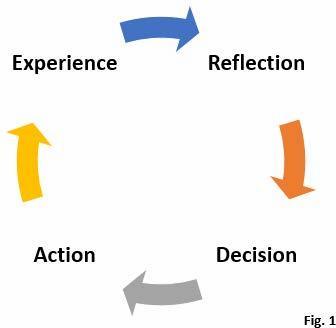
Figure 1.
PEDAGOGICAL ELEMENTS FOR VALUES EDUCATION WITH THE EARTH CHARTER
This study identified the following ideal and basic seven pedagogical elements for values education with the Earth Charter or education for sustainable development and global citizenship:
1. The Human Connection
In any education experience, the human relationship established between those involved in the processisafundamentalcomponent.Thisconnection,or bond, that is generated both between teacher-learner and between learners can drive or become a roadblock to the process. Depending on the kind of human connection established, it could help or hinder the process. Therefore, it is important to be mindful of this while conducting the learning process, with the intention to make it an inspiring and special human experience.
Most of us would easily remember those teachers who made an impact in our life due to the way they were and to the human connection they established with us. Moreover, when we consider working with values education with the Earth Charter, it is essential to be consistent with the values stated there: the ethic of care and respect must always be present through the human relationship established in the learning environment. Respect and care can- not be taught without living them, it is required to reflect and model these values through human interactions.
2. TheHuman-NatureConnection
Modern societies suffer from the disconnection (or the perception of it) with the natural environment and the loss of the link with nature. This is why it is important to generate spaces to experience the natural environment and to get to know and connect with it. The rationale is that to take care of something you have to know it and must have had some kind of bond with it, which emerges from experience. In this sense, may the experience of values education with the Earth Charter allow us to connect or reconnect with the natural environment. May it lead us to experience the natural world around us in such
a way that we will discover (or rediscover) the sound of a waterfall, of the waves of the sea, of the rain, the sounds of a bird or a cricket ...
This experience should enable us to feel the warmth of the sun, the breeze that touches and caresses our skin and the air that we exchange and keep us alive. May this experience give us the time to reflect on this and awaken our capacity of wonderment when we smell a flower, when we see the clouds and the color of the sky, and when we observe the colors of the earth, plants and trees. This should assist in bringing us back to our human essence.
3. Question
It is essential to generate questions that give rise to reflection,concernandcuriosity,orthatstimulateanawareness about the current and future challenges and about the consequences of our actions. Questions about what we do, how we think and why, questions that help us be aware of our mental models and look at them with a critical eye. Questions that generate a process of values clarification and examination; that lead us to identify our individual and cultural values through our decisions and attitudes.
This includes allowing the space to con- sider different interpretations of the underlying values of sustainability and global citizenship, their meaning and how these can be envisioned in practice, as well as the space for those participating in the process to generate their own questions. May the experience of values education not simply be a space to give, or seek, simple answers but rather of constant questioning about our actions, ways of living and relating to others and its consequences. A good question will spark the interest of a disengaged person to go into a search mode.
4. Dialogue
Dialogues can stimulate reflection about our different worldviews, about our values and our interpretations of values, about our present and future perspectives, allowing for the expansion of our consciousness. Through dialogues, we can identify values, or the lack of them, in our actions and worldviews. Dialogues about our dilemmas and inconsistencies between
what we do, what we believe is correct and about the impact of this on the environment, can open our eyes, change our perception of things and expand our consciousness. May the experience of values education not be one of a monologue, but rather of inter- actions and dialogues.
5. Aesthetics
How we organize and present a topic is as import- ant as the content/topic itself. It is therefore necessary to be mindful of the learning space so that it inspires and awakens curiosity and connection. The physical space/environment, where an education activity takes place, is an essential element of this process. It is a sort of entry door that invites us to be willing to be there (or not). It reflects values in practice. Thus, it is important to be consistent with what is proposed; t is not possible to stimulate dialogue, interaction, creativity or learning about care, democracy and participation in an environment that does not reflect these elements. May we be mindful of the importance of the education setting and space. May the colors, smells and beauty of the place where the learning process takes place reflect the values of respect, care and diversity, and as such, be conducive to the learning process and to awaken our emotions and with that the creativity of those who participate in the process.
6. Art, Stories & Metaphors
Art, metaphors, and stories are vehicles of communication and sensitization that spark emotions and imagination. These are languages, ways to communicate, that help illustrate a message in such a way that people can easily relate an idea or concept to something concrete. These languages feed our worldviews and make a complex or abstract concept acquire shape and meaning. These elements were already part of the pedagogical approach of the first Earth Charter children workshop we organized in 1997. In 2004, when we were putting together the booklets Educating for a Sustainable Lifestyle with the Earth Charter, we intentionally inserted stories, metaphors, art, and illustrations as part of these materials with a clear understanding of the value of including these elements in our efforts. However, it is good to note that it is relatively normal to find these elements in activities developed for children,
especially in non-formal education settings, but as we grow, these elements disappear from our education experience. What I found out, observing my experience working with adults for over 15 years, in formal and non-formal education settings, is that the same elements apply with adults when it comes to finding ways to nurture values through education with the Earth Charter. May theexperienceofvalueseducationbeheldthrough art in its various languages, as well as through stories and metaphors, created and lived by the participants in the process or by others.
7. Integral & Systemic Approach
Systemic thinking is a skill and an approach that helps us consider and understand the relationship of things and the complexity of life. For a values education process to be transformative, it is necessary to look at things with an integral and comprehensive approach and con- sider all dimensions of human beings in the learning process, that is: the mind, the body, the emotion and the spirit (both of learners and educators). Some refer to head, heart, hands and soul. In addition, the ethics of care, respect and responsibility with the community of life must be reflected not only in the pedagogy itself, but also in the institution “ethos”, that is, in the culture of the educational institution. May thevaluesinherentto sustainability and global citizenship permeate the whole educational experience and that this experience embraces an integral approach of the learner and the content.
The elements described above can be found in many of the experiences identified and analyzed in my research, as well as in my own experience developing and facilitating courses and workshops in this area. These elements should not be viewed as the result of an exhaustive study or a complete list of what can be identified through these examples of experiences. They are simply some key elements that I have experienced and found in these examples of using the Earth Charter in education, which I consider to be fundamental for any values education process.
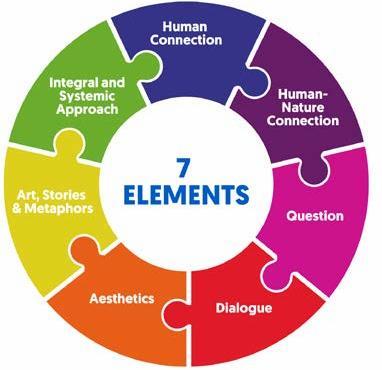
Education for sustainability and global citizenship is essentially values education. In order to address current problems of our societies and to reorient our course towards a better path, it is necessary to examine our world views and actions and the values that underline them; to make space to question our assumptions and world views and possibly to reconfigure our value systems. This is not a luxury. As long as we continue to consider values education unnecessary in practice and not make it part of a new approach to quality education and central to education for social transformation, we can only expect to continue experiencing undesired social and environment impacts due to the bad decisions made by ethically, socially, and ecologically illiterate leaders.
Author's note: This is a summary, and parts of it an extract, of my doctoral research on “Teaching and Learning Values of Sustainability and Global Citizenship through the Earth Charter: Pedagogical Elements.”
Figure 2. Pedagogical elements for values education with the Earth Charter.
REFERENCES
Dower, N. (2005). The Earth Charter and Global Citizenship; A Way Forward in Corcoran et al. The Earth Charter in Action: Toward a Sustainable World. Kit Publishers, Netherlands.
Earth Charter International. (2000). The Earth Charter
Earth Charter International. (2009). A Guide for Using the Earth Charter in Education. Retrieved from: https://earthcharter.org/library/guide-for-usingthe-earth-charter-in-education
UNESCO. (2005). United Nations Decade of Education for Sustainable Development (2005 – 2014): Framework Implementation Plan. Paris: UNESCO.
UNESCO. (2015). Incheon Declaration and Framework for Action for the Implementation of Sustainable Development Goal 4. Retrieved from: https://unesdoc.unesco.org/ark:/48223/pf0000245656
United Nations Organization. (2015). Sustainable Development Goals.
Vilela, M. (2019). Teaching and Learning Values of Sustainability and Global Citizenship through the Earth Charter: Pedagogical Elements.
Vilela, M. and al. (2005). Educating for a Sustainable Lifestyle with the Earth Charter. Earth Charter International
BookReviews
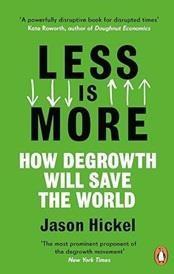
Jason Hickel
LESS IS MORE: HOW DEGROWTH WILL SAVE THE WORLD
Penguin Books, 2022, 322 pages
Joe Holland offers two review essays on this book by Jason Hickel
The first essay, slightly edited here, is reprinted from EcoSpirit BookNotes, where it was published by SSGN on 4 March 2024. The second review essay, which follows this first one, is a new one.
JASON HICKEL'S IMPORTANT BOOK ON DEGROWTH
Joe Holland
WTHIN THE MODERN WORLD – originally Western but now globalized and approximately 500 years old – a small and elite minority of business people, literary writers, journalists, natural scientists, philosophers, politicians, social scientists, religious leaders, and theologians has been attempting to move Modern Industrial Civilization's still-expanding global ecological devastation onto the center stage of our human consciousness.
At the same time, the growing global and elite-led New Right, increasingly allied with hyper-rich investors in hi-finance, fossil fuels, hi tech, and other extractive industries, is employing the successful authoritarian propaganda technique of scapegoating lies to stir up populist fear and anger. Those hyperrich investor-elites are attempting to use the New Right to keep global ecological devastation from reaching that same center stage of our human consciousness.
Meanwhile, if asked, the vast majority of university-educated people may acknowledge the global ecological crisis. However, busy with other things, they typically reduce global ecological devastation to what they see as only one of many disjoined issues competing for their limited attention, or they simply ignore it
Some of these busy people may see the solution to global ecological devastation as the incremental implementation of sustainable practices. Others may even perceive the need to replace fossil fuels with renewable energy. Yet
for most people with ecological consciousness, the bold claim that Modern Industrial Capitalism's foundational drive to constantly grow is causing the sixth great extinction of Earth life, would probably sound absurd.
A CHALLENGING BOOK
Even so, British economic anthropologist Jason Hickel, writing in an admirably pedagogical style and with extensive research, makes that bold claim in his book LESS IS MORE: HOW DEGROWTH WILL SAVE THE WORLD.
Jason Hinkel introduces his book by explaining recent scientific reports on Climate Change. They confirm what many scholars have argued, namely, that we have now entered Earth's Anthropocene Epoch. In this new geological period, human activity has been disrupting Earth's chemical-biological equilibrium. As a result, in the words of Elizabeth Kolbert's book title, our home planet Earth is now entering "The Sixth Extinction" of its once flourishing life.26
After introducing his book, Jason Hickel builds on his bold claim to argue two foundational themes, with approximately one-half of the book devoted to each.
Part 1 – The Ecological Failure of Growth
In the first half of the book, Jason Hickel calls for a dramatic transition from "growth" to "degrowth." In doing so, he makes three arguments: 1) that Capitalism, which he states cannot survive without growth, arose out of brutal centuries of colonizing and exploiting human labor and Nature; 2) that the global super-rich have used Capitalism's growth to take a disproportionate share of growth's benefits by socially impoverishing much of our human family and ecologically devastating Nature; and 3) that Modern Technology, which Capitalism holds up as our religious-like savior, will not save us.
Jason Hickel fundamentally argues that modern Capitalism is based on the unnatural drive by elites to accumulate ever more capital. He also argues that
26 Elizabeth Kolbert, THE SIXTH EXTINCTION, 10TH Anniversary Edition (Holt Paperbacks, 2024).
Capitalism's unjust and anti-ecological compulsion to grow is no longer sustainable. It is now devastating Earth's ecosystems and our human dwellings within them.
In the second half of the last century, the Club of Rome published its 1972 report THE LIMITS TO GROWTH and its 1974 sequel report MANKIND AT THE TURNING POINT. Both reports pointed to the contradiction of continuing unlimited growth within a finite planet, and they warned of severe consequences. At the time, many elite commentators ridiculed those reports. However, subsequent scientific analyses confirm that the pursuit of unlimited growth in a finite planet constitutes an irrational ecological contradiction, and it threatens Earth life on a planetary scale, including human life.
Jason Hickel defines the capitalist drive to accumulate as intrinsically colonialist – parasitically and unjustly extracting wealth for the hyper-rich from human labor and Nature, while giving back little or nothing in return. In particular, he describes how that ongoing process of anti-human and anti-ecological colonization of labor and Nature expanded dramatically with the European invasion and conquest of the Americas. He also describes how that colonization process subsequently grew to its present global scale. Finally, he sees that capitalist drive, now enhanced by electronic communications, also beginning to colonize our human minds.
Part 2 – Degrowth as Ecological Regeneration
In the second half of his book, and in response to the contradiction explained in the book's first half, Jason Hickel calls for dramatic "degrowth" within the 'advanced' colonizing countries of the Global North, which have been the ecologically most destructive countries.
He then calls for implementing a new "degrowth" model of Ecological Economics across the Global North and the Global South – with a more egalitarian distribution of income and wealth, appropriate technologies, and sustainable ecological regeneration. He argues that this ecological model of degrowth can stop "the sixth extinction" of Earth life, and that it can open a
flourishing path of sustainable regeneration for Nature and for our human species within it.
This second half of Jason Hickel's powerful book has three sections. His first section, with abundant practical examples from contemporary global experience, lays out his vision of degrowth as the "good life." His second section, also with abundant practical examples, explores what he calls "Pathways to a Post-Capitalist World."
In his third section, Jason Hickel first argues that the 17th-century Scientific Revolution's "Mechanical Philosophy" is an erroneous philosophy that has misguided much of Modern Science and Modern Technology to the present day. He then argues that growth has now led human society into catastrophic global ecological devastation.
(In my essay "This New Long Dark Winter's Night," found earlier in this issue, I describe what 17th-century natural philosophers [early-modern scientists] called the "Mechanical Philosophy" as more deeply rooted in what I call the "Atomist Cosmology of Mechanical Materialism," which those natural philosophers appropriated from the anti-religious and reductionist Atomism of the classical Greek philosopher Epicurus [341-270 BC]. However, Jason Hickel does not seem aware of this deeper philosophical root cause.)
He further argues that recent scientific discoveries (some from new Ecological Sciences) have moved beyond the Mechanical Philosophy's analytical fragmentation of reality. Those discoveries, he states, prove that the Mechanical Philosophy is erroneous. They also reveal that everything in the Universe, from micro-atomic to macro-astronomical levels, is interrelated and functions through holistic systems, with Earth itself as a systemic whole.
Finally, as a trained anthropologist, Jason Hickel shows how this inter-relational, systemic, and holistic understanding of the Universe resonates with the ancient ecological wisdom of Indigenous Peoples, whom he sees as a living legacy helping to shape a viable future for Nature and for us humans who remain an organic part of Nature.
FRIENDLY CRITICISMS
Overall, Jason Hickel's book constitutes a challenging contribution to our late-modern consciousness. However, while I strongly recommend his book, I have two friendly criticisms that require a lengthy explanation. I will explain the first criticism below and hold the second one for a follow-up essay.
I also have a third criticism that does not require a lengthy explanation. It is simply that his book limits its analysis to the global capitalist experience and does not analyze the global communist experience.
Surely, we cannot adequately study global Industrial Civilization if we exclude the industrial-communist giant of China. Nor should we study Capitalism's modern social-philosophical tradition of Liberalism without also studying Communism's opposing modern social-philosophical tradition of Marxism. Though mutually opposed, both modern social philosophies share cosmological grounding in the erroneous Epicurean Cosmology of Mechanical-Materialist Atomism, which undergirded the 17th Century's Scientific Revolution.
(In my earlier essay already noted, I described Industrial Capitalism and Industrial Communism as together constituting Modern Industrial Civilization. I then proposed that Modern Industrial Civilization, in this broader sense, has already entered its terminal breakdown, and that its wider historical framework, the more than 500-year cycle known as the Modern World, is also coming to is terminal end.)
Criticism 1 - The Transition
My first friendly criticism concerns what Jason Hickel describes as the transition from a Capitalist Growth Economy to a Post-Capitalist Degrowth Economy. This transition would indeed be profound. However, his book does not adequately address this transition as an in-between process, which I believe will be lengthy, complex, confusing, and dangerous.
I cannot imagine contemporary global society easily transitioning from capitalist growth to post-capitalist degrowth without also experiencing great
economic, political, cultural, and spiritual upheaval, most likely including massive violence. Jason Hickel may be aware of this problem and deliberately left it out to keep his economic argument free from political complexity. Even so, it needs to be addressed.
Early in the 19th century, the German philosopher Georg Wilhelm Friedrich Hegel (1770-1831) studied major historical transitions in human history, at least those he knew about. Among them was the Napoleonic Revolution taking place outside his door. Hegel concluded that all past great transitions had been violent and bloody. For that reason, he famously stated: "History is a slaughter bench."
Will this new transition from a Capitalist Growth Economy to a Post-Capitalist Degrowth Economy, if it indeed happens, be different? Unlike earlier great transitions, will it instead be non-violent and unbloody? I doubt it.
Therefore, in beginning this new great transition, we need to seriously consider the strategic question of how to navigate through it economically, politically, culturally, and spiritually. However, apart from a few authors (one of whom I will mention at the end of this section), such thought has not yet become part of the mainstream global ecological movement. But such thought is needed, because this great transition, if it happens, will no doubt be long, confusing, difficult, and dangerous. It will probably also be violent and bloody.
The current rise of the global New Right gives us advanced warning about frightening and violent political, economic, cultural, and spiritual traumas that will probably accompany this breakdown of the Modern World.
Again, many super-rich global investors in hi-finance, fossil-fuels, and other anti-ecological extractive industries heavily fund the global New Right. Those other extractive industries include hi-tech companies that "mine data" from our personal lives and consume humongous amounts of energy and water for their giant data servers. Also, some hi-tech ideologues now preach a libertarian social philosophy that draws on the writings of 19th and 20th-century nihilist and fascist philosophers.
Further, many super-rich funders of the global New Right are now developing the anti-democratic global oligarchical-populist movement. Their goal is to protect their massive and lucrative investments in hi-finance, hi-tech, fossil fuels and other anti-ecological extractive. Their strategy is to sow chaos, undermine regulatory and social-welfare policies, disrupt the social order, and establish an authoritarian government that will coercively protect their antiecological investments.
In addition, the New Right's expanding political chaos, economic disruption, and social cruelty slowly but tenaciously expand social-ecological devastation, and its geopolitical disruption could even trigger the more rapid socialecological devastation of thermonuclear war.
What, then, will be a creative global counter-strategy to undercut the New Right's frightening threat to natural and human ecology? How will we create a politically viable and antiviolent global transition process? These remain important questions, but they remain largely unanswered questions.
A helpful start to answering these questions is the new book by Dana Fisher, a professor at American University's School of International Service, SAVING OURSELVES: FROM CLIMATE SHOCKS TO CLIMATE ACTION (Columbia University Press, 2024). On the book's back cover, Harvard professor Naomi Oreskes (herself a prophetic climate intellectual) insightfully describes the vision of Dana Fisher's book as follows:
We can create a stronger climate movement by building on existing community structures – such as churches and labor unions – and taking advantage of the climate shocks that are already occurring with increasing frequency to channel moral outrage into meaningful action.
Criticism II - Philosophy & Religion
My second friendly criticism of Jason Hickel's MORE IS LESS concerns one short but problematic narrative about philosophy and religion. I will address this criticism in my second review essay, which now follows.
JASON HICKEL'S NEGATIVE CLAIMS ABOUT RELIGION & PHILOSOPHY
Joe Holland
AGAIN THIS SECOND ESSAY IS A FRIENDLY CRITICISM of negative claims about both classical Western philosophy and the religions of the Axial Age, as found in Jeremy Hickel's book MORE IS LESS.
But those claims about philosophy and religion are not a major part of this otherwise important book. While they are instances of poor historical scholarship, they appear mostly in one small section of the book (pages 63-68). Hence, these negative claims do not invalidate the book's fundamental purpose of arguing for the shift from a growth economy to a degrowth economy. But they could alienate religious people from this otherwise excellent text.
MODERN SECULARIST IGNORANCE
My concern is not simply with Jason Hickel's negative claims about world religions and classical Western philosophy, but also about similar claims made by many other modern secularist intellectual elites. Fortunately, however, not all modern secularized intellectuals succumb to such historical ignorance. Many do reflect careful and nuanced historical scholarship in these areas.
Even so, many key modern secularized intellectual elites dismiss classical Western philosophy as "metaphysics," as if the very concept were preposterous. Two early-modern and foundational figures for this prejudice against metaphysics in the Anglo-Western tradition were the English intellectual Francis Bacon (1561-1626) and the Scottish intellectual David Hume (1711-1776).
But Jason Hickel has not completely followed this philosophical prejudice because, while he rightfully critiques Western philosophical dualism, he also supports what he calls Indigenous "animist" religions and classical Western sources of philosophical holism, which he identifies with the Greek philosopher Aristotle and the Roman Stoics Cicero and Seneca.
Many modern secularized intellectuals also dismiss religion. For example, the distinguished journalist for The Atlantic, Anne Applebaum, recently wrote in an article titled "The New Rasputins" (February 2025 issue) that "traditional religions are in long term decline." Yet that statement defies empirical evidence. As the Harvard political scientist Samuel Huntington wrote earlier with extensive evidence:
The nineteenth century saw increasing [Western] confidence that science would dethrone religion … Modernization and modernity appeared to be undermining religion … In the last quarter of the twentieth century, however, the [Western] march toward secularism was reversed. An almost global resurgence of religion got underway, manifest in almost every part of the world – except in Western Europe … The twenty-first century is beginning an age of religion.27
As mentioned, Jason Hickel also does not succumb totally to the modern secularist intellectual prejudice against all religion, for he writes positively about the holistic religious traditions of Indigenous peoples.
So, if he is positive toward indigenous religious traditions and toward holistic streams in classical Western philosophy, where is the problem? The problem is in his un-nuanced and unscholarly critiques of classical Western Philosophy and world religions of the Axial Age. Again, that problem in Jason Hickel's book is found on pages 63-67, in a section titled "The Great Separation."
27 Samuel Huntington, WHO ARE WE? THE CHALLENGES TO AMERICA'S NATIONAL IDENTITY (Simon & Schuster, 2004), p. 356. On new and violent forms of religious ascendancy, see Mark Juergensmeyer, GLOBAL REBELLION: RELIGIOUS CHALLENGES TO THE SECULAR STATE, FROM CHRISTIAN MILITIAS TO AL QUEDA (University of California Press, 2008).
THE GREAT SEPARATION
Jason Hickel begins his narrative in these pages by critiquing the "transcendental" philosophies and religions of the Axial Age – a global period from the 6th to the 3rd centuries BC, as identified by the German philosopher Karl Jaspers (1883-1969).
Jason Hickel claims that these "transcendental" religions and philosophies reflected the rise of the world's first great empires, and that they split the world in two, with a higher spiritual realm of gods above and a lower material creation below. Further, he describes this ontological split as one where the gods above rule through "dominion" over the world below, and the humans, like the gods, rule over the rest of creation. He contrasts that with what he calls "animist ontologies" that find spirit within matter.
Errors about Religion
For religions, Jason Hickel mentions Confucianism, Hinduism, Zoroastrianism, Judaism, and Greek "Sophism." But he really does not address Confucianism, Hinduism, or Zoroastrianism. Instead, he zeroes in, first, on Judaism and, second, on Greek "Sophism, which he soon links with Christianity. For his religious-philosophical analysis, Judaism and Greek Philosophy and Christianity implicitly serve to illustrate all the religions of the Axial Age, which is a preposterous claim. Nonetheless, I will stay with Jason Hinkel's triangular focus on Judaism, Greek Philosophy, and Christianity.
He next moves to his claim that the "dominion" (meaning domination) theme is exemplified in the mandate of the Jewish book of Genesis (also appropriated by Christians), which states, "And God said, Let us make man in our image, after our likeness: and let them have dominion" (over every living creature).
However, biblical scholars have persuasively demonstrated that the Hebrew word translated as "dominion" cannot mean the modern understanding of domination. While classical and modern translators and commentators may often have interpreted it that way, the text itself argues against it. Made in the "image of God, the human creature is called to imitate God, whom Genesis
portrays as creating everything as filled with goodness. So, if the human creature is to be like God, then the human creature needs to respect every creature in its goodness.
Later in Genesis, a second creation narrative describes the human creature as "the Earth creature" ("Adam" or ha adam in Hebrew, which is a masculine noun), who is taken from the Earth (ha adamah in Hebrew, which is a feminine noun). The poetic linkage of adamah and adam resonates with a mythic concept of the Earth Mother bringing forth her Earth Child. Still later in Genesis, in the ancient tale of Noah's Ark, the human Earth creature Noah is told to rescue and care for representatives of myriad other species of Earth creatures. Surely that is not cruel domination.
Hence, human Earth creatures, whom the Creator draws from Mother Earth, are called to be like the Creator by respecting and caring for the goodness of all their fellow Earth creatures and to care for them as did Noah. Also, the entire Hebrew Torah contains abundant legislation requiring protect and care for non-human creatures.
Further, the Hebrew Psalms are filled with non-human creatures, even mountains and whales, praising (along with humans) the Creator who is good and loving. So great is the Book of Psalms' concert of praise as sung by all creatures to the Creator that we may rightfully say the Book of Psalms is full of holistic "animist ontologies." Yet that should not be surprising because the original tribes of Israel were Indigenous tribal peoples.
Finally, the Hebrew scriptures' Book of Exodus tells the story – really the foundational story of the Hebrew scriptures – about the Creator liberating the captive Hebrew slave population from enslavement and domination by the Egyptian Pharoah. This story later became the inspiration for African-American slaves seeking their own liberation. This story has also been the inspiration for contemporary Theologies of Liberation. Thus, the God of Exodus is the God not of domination but of Liberation.
Clearly, Judaism is not fundamentally a religion of domination. With the Exodus from Pharaonic Egypt being the foundational event of Judaism, the Jewish religion is based instead on prophetic liberation from such domination.
But none of these other Jewish stories appear in Jason Hickel's narration. Thus, he has cherry-picked for his alleged proof a single misinterpreted text. Plus, in addition to lacking scholarly understanding of this biblical text, he has added the fallacy of generalizing from one (misinterpreted) text
Nonetheless, it is shamefully true that major voices in Jewish and Christian history, including today, have often interpreted those biblical narratives as mandates for domination. Given that reality, the contemporary task is not to dismiss Judaism (or Christianity) as a religion of imperial "domination," but rather to recognize the ongoing struggle between prophetic faithfulness and idolatrous corruption. In such corruption, the religious institution becomes both an instrument of domination and implicitly makes itself the object of worship (in place of the Divine Mystery) But such developments are unfaithful to the tradition's original foundations.
Exemplifying how that contrast is central to the foundations of Christianity, the Christian Book of Revelation (or Apocalypse) addresses seven "churches" of Western Asia (in today's Turkey). Of these seven, it praises three and condemns four. All these churches have been called to seek the "Kingdom of God," but they clearly are not themselves the "Kingdom." Rather, they are called to serve the "Kingdom," yet four have become filled with evil and corruption.
Again, Jason Hickel's failure here is to reduce a particular religion to one cherry-picked misinterpretation of the text and then to use that text as the false foundation for a sweeping generalization about Axial Age religions. His deeper error is to sociologically forget that religious institutions, like all human institutions, are internally complex and diverse, with internally opposed forces. Religions are movements and organizations called to follow a foundational prophetic vision, but the movements and organizations are not themselves that vision, and they frequently stray from it.
Errors about Philosophy
Again, for philosophy, Jason Hickel critiques Plato and the later influence of Platonism on Christianity, while he praises Aristotle and Roman Stoics, like Cicero and Seneca, for seeing the entire Cosmos as a living organism. Being myself also drawn toward the philosophical holism of these same sources and having been long critical of the Platonic tradition, I agree with Jason Hickel here.
However, I also recognize that the Platonic tradition does contain valuable resources for awareness of cosmic holism. While the Platonic tradition is indeed founded an ontological dualism that can easily support escapism from the material world, the Platonic tradition can also be inverted to celebrate the immanent presence of the transcendent Divine Mystery within the material world. That is what the great Keltic-Catholic missionaries and scholars did across Europe and its Western Isles throughout the early-medieval period.28
Paradoxically, Jason Hickel unconsciously recognizes this Platonic inversion when he praises what he calls the "animist ontology" of the 15th century philosopher of the Florentine Renaissance, Pico della Mirandola. Yet as scholars widely recognize, Pico della Mirandola was a Platonist, and Plato himself portrayed the Universe as a "single Living Creature that contains all living creatures within it."29
Next, Jason Hickel turns to the rise of the what he calls Christian Roman Empire and what I call the "Imperial Church" (though, with no historical or sociological nuancing, he simply calls it "the Church"). He correctly identifies the rise of that Imperial Church with Platonism and with what Latin monasticism celebrated as the "contemptus mundi I" (contempt for the world). However, he appears to be ignorant about the alternative of medieval Keltic monasticism, which was deeply rooted in a Christianized form of Indigenous Keltic "animist"
28 For a contemporary example of this Platonic inversion, see David Fideler, RESTORING THE SOUL OF THE WORLD: OUR LIVING BOND WITH NATURE'S INTELLIGENCE (Inner Traditions, 2014). As David Fideler shows.
29 Fideler, RESTORING, page 3.
spirituality, and which in the early medieval period flourished across Europe and its Western Isles.30
In addition, he describes "Christendom" as having persecuted the "Celtic Druids" without recognizing that major sectors of Keltic Druidism in England, Ireland, Scotland, and Wales freely embraced Catholic Christianity and reinterpreted it in an Indigenous manner that was faithful to the "animist" spirituality of both the Hebrew Psalms and the Keltic clans (However, Latin Catholic monks, in alliance the Catholic papacy, later tried to repress the Keltic Catholic form of Christianity and to impose in its place the Roman Catholic form.
Further, he condemns "the [medieval] Church" for denouncing Aristotle as "heretical," without realizing that the high-medieval Catholic intellectuals Albertus Magnus and Thomas Aquinas brought their Christianization of Aristotle into the center stage of Roman Catholic theology, where in many ways it still remains today.
Lastly, Jason Hickel, though claiming the authority of anthropologists for his arguments against transcendent and dualist forms of philosophy and religion, refers for his source only to historian Carolyn Merchant's excellent and now classic book THE DEATH OF NATURE: WOMEN, ECOLOGY, AND THE SCIENTIFIC REVOLUTION (Harper & Row, 1980). But, as anyone who has studied that important book will quickly realize, his reliance on that book is not fully faithful to Carolyn Merchant's complex and nuanced scholarship.
A WIDER PROBLEM
Historical ignorance and cultural arrogance toward the premodern traditions of philosophy and religion constitute what I call the modern secularist-elitist temptation. That temptation leads those who succumb to it to believe that the modern secularist and elitist intellectual consciousness has become the normative peak point for human knowledge and judgement. It also leads those
30 See Joe Holland, REMEMBERING KELTIC-CATHOLIC CHRISTIANITY, Occasional Paper 2024, Pacem in Terris Center for Catholic Social Teaching, at https://paceminterris.net/papers
who succumb to that temptation to conclude that they may simply reject most pre-modern wisdom traditions in philosophy and religion. No need to study them with scholarly care or deep intellectual curiosity.
Secularist-Elitist Contempt for the Religious Populist Base
A cruder part of that same temptation for many modern secularist-elitist intellectuals – a tiny minority within our wider political communities – is to look down with cultural arrogance upon the broad populist base 'below' them. Those secularist-elites intellectuals may then name rural or small-town sectors of that populist base as "rednecks," hillbillies," "basket of deplorables," or "people who cling to guns and the Bible."
Such cultural arrogance also appears when secularist elite writers of TV and Hollywood programs (usually graduates of intellectually elitist secularized universities) ridicule urban, small-town, and rural working-class people and small business owners of various ethnic traditions.
In response, and understandably so, that broad religious-traditionalist populist base becomes resentful toward the secularist-elitist intellectual minority that holds it in such contempt. That resentment becomes even more bitter when the secularist-elitist minority grows increasingly affluent, while the religious populist base becomes increasingly impoverished.
As that conflictual dialectic expands with the increasingly affluent secularist elite minority expressing upper-class contempt toward the increasingly impoverished and increasingly resentful lower-class populist majority, the parasitical New Right has a field day in recruiting followers from that angry and alienated populist majority.
The New Right thus preys on and amplifies the detritus of degenerative polarization now spreading across the body politic with its increasing cultural-spiritual decay. At the same time, the reactive energies of populist religious-traditionalist resentment begin to succumb to their own temptations of racist-
misogynist hatred and violence, which can then take repressive and sometimes violent expression in new forms of ethno-nationalist Fascism.
In sum, I agree that we need to make major criticisms of the dominant Western philosophical and religious traditions, even reaching back into the Classical Era. But we must be careful not to throw out the baby with the bathwater because, in addition to being historically ignorant and culturally arrogant, it is also politically counter-productive.
The Extreme Case of Jeremy Lent
Among the many secularizing writers about ecology who have trampled over the academic fields of philosophy and religion without careful scholarship or cultural openness, the most problematic example in my mind is the English environmental author, Jeremy Lent.
Jeremy Lent is a former entrepreneur in hi-tech Finance Capitalism with a master's degree in business administration from the University of Chicago. (Disclosure: the University of Chicago is also my alma mater, although my doctoral degree was not in business.) He admirably underwent radical rethinking of his life's vocation following his wife's tragic death. I presume he also underwent that change with sufficient monetary gains from his foray into hi-tech Finance Capitalism to support his new role as an independent secularizing elite writer on the need for ecological transformation of global human consciousness.
After his personal transformation, Jeremy Lent became a self-taught synthesizer and popularizer reporting on cognitive science and evolutionary biology. Concerned with the need for ecological transformation of global human consciousness, he soon became well known for his two large books, THE PATTERNING INSTINCT (2017) and THE WEB OF MEANING (2021).
Yet in the first book, Jeremy Lent described Monotheism as a "scourge," and he even harshly rejected the monotheist religion of his own Jewish roots.
Hardly a recipe for developing a broad populist base for ecological transformation of global human consciousness!
However, he does support Chinese Daoism, which he sees it as a universal panacea for ecologically transforming human consciousness. He can make that an easy application, but, in a reductionist manner, he misinterprets the transformation of human consciousness as the replacement of a computer operating system
I will not continue with my critique of Jeremy Lent's simplistic views, although I will perhaps do a future review of his two major books. Suffice it to say here that, despite his helpful popularizing synthesis of cognitive science and evolutionary biology, his modern secularist-elitist rejection of the classical Western philosophy and world religions, apart from Daoism, reeks even more of the secularist-elitist intellectual temptation to historical ignorance and cultural arrogance. And, of course, such ignorant and arrogant reductionism is also politically counter-productive.
RELIGIOUS RESOURCES
The great paradox here is that, while many modern secularist-elitist intellectuals ignorantly and prejudicially reject major world religions (especially Judaism and Christianity, including their use of philosophy), prophetic leaders from major world religions have become some of the strongest global voices for ecological spirituality, Earth care. and ecological justice.
For example, we see those prophetic voices in Pope Francis' 2015 encyclical letter LAUDATO SÍ - ON CARE FOR OUR COMMON HOME; in the 2025 Islamic document, AL MIZAN - A COVENANT FOR THE EARTH by the Islamic Foundation for Ecology and Environmental Science; and in the 2025 World Council of Churches' document, HOPE FOR THE CHILDREN THROUGH CLIMATE JUSTICE. (See the next section of this journal for more information on these religious resources.)
Further, as we also see clearly today, both business leaders and political leaders, with only a few exceptions. are revealing themselves incapable of
adequate response to the global ecological crisis. Similarly, contemporary universities – the typical home of modern secularist-elitist intellectuals – are also largely revealing themselves incapable of adequate response to the global ecological crisis.
Therefore, it is now time for many modern secularist-elitist intellectuals to wake up to the fact that they are increasingly out of touch with the mainstream of popular culture, and to free themselves of ignorance about and prejudice toward our human family's world religions that, despite their many problems, are bringing forth powerful prophetic voices and social movements to challenge global ecological devastation.
It is thus time for the modern secularist-elitist intellectuals to join hands with prophetic leaders of our human family's major religious traditions on behalf of global social-ecological regeneration, and on behalf of a future Global Ecological Civilization.
Resources
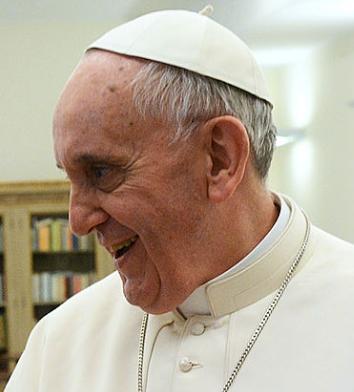
Wikipedia | Casa Rosada LAUDATO SÍ ON CARE FOR OUR COMMON HOME Pope Francis 2015
https://www.vatican.va/content/francesco/en/encyclicals/documents/papa-francesco_20150524_enciclica-laudato-si.html
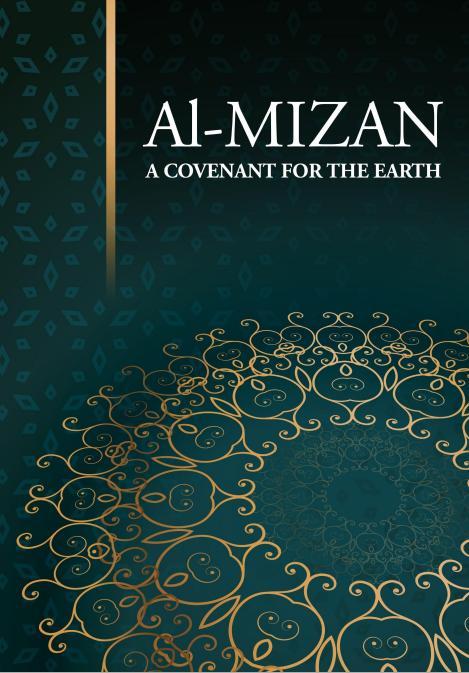
https://www.almizan.earth
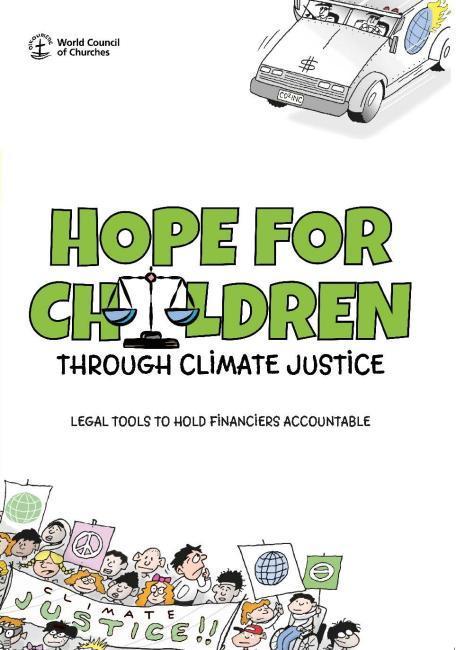
WORLD COUNCIL OF CHURCHES 2025
https://www.oikoumene.org/resources/publications/hope-for-childrenthrough-climate-justice

